- Privacy Policy
Buy Me a Coffee

Home » 500+ Physics Research Topics

500+ Physics Research Topics
Table of Contents

Physics is the study of matter, energy, and the fundamental forces that govern the universe. It is a broad and fascinating field that has given us many of the greatest scientific discoveries in history , from the theory of relativity to the discovery of the Higgs boson. As a result, physics research is always at the forefront of scientific advancement, and there are countless exciting topics to explore. In this blog post, we will take a look at some of the most fascinating and cutting-edge physics research topics that are being explored by scientists today. Whether you are a student, researcher, or simply someone with a passion for science, there is sure to be something in this list that will pique your interest.
Physics Research Topics
Physics Research Topics are as follows:
Physics Research Topics for Grade 9
- Investigating the properties of waves: amplitude, frequency, wavelength, and speed.
- The effect of temperature on the expansion and contraction of materials.
- The relationship between mass, velocity, and momentum.
- The behavior of light in different mediums and the concept of refraction.
- The effect of gravity on objects and the concept of weight.
- The principles of electricity and magnetism and their applications.
- The concept of work, energy, and power and their relationship.
- The study of simple machines and their efficiency.
- The behavior of sound waves and the concept of resonance.
- The properties of gases and the concept of pressure.
- The principles of heat transfer and thermal energy.
- The study of motion, including speed, velocity, and acceleration.
- The behavior of fluids and the concept of viscosity.
- The concept of density and its applications.
- The study of electric circuits and their components.
- The principles of nuclear physics and their applications.
- The behavior of electromagnetic waves and the concept of radiation.
- The properties of solids and the concept of elasticity.
- The study of light and the electromagnetic spectrum.
- The concept of force and its relationship to motion.
- The behavior of waves in different mediums and the concept of interference.
- The principles of thermodynamics and their applications.
- The study of optics and the concept of lenses.
- The concept of waves and their characteristics.
- The study of atomic structure and the behavior of subatomic particles.
- The principles of quantum mechanics and their applications.
- The behavior of light and the concept of polarization.
- The study of the properties of matter and the concept of phase transitions.
- The concept of work done by a force and its relationship to energy.
- The study of motion in two dimensions, including projectile motion and circular motion.
Physics Research Topics for Grade 10
- Investigating the motion of objects on inclined planes
- Analyzing the effect of different variables on pendulum oscillations
- Understanding the properties of waves through the study of sound
- Investigating the behavior of light through refraction and reflection experiments
- Examining the laws of thermodynamics and their applications in real-life situations
- Analyzing the relationship between electric fields and electric charges
- Understanding the principles of magnetism and electromagnetism
- Investigating the properties of different materials and their conductivity
- Analyzing the concept of work, power, and energy in relation to mechanical systems
- Investigating the laws of motion and their application in real-life situations
- Understanding the principles of nuclear physics and radioactivity
- Analyzing the properties of gases and the behavior of ideal gases
- Investigating the concept of elasticity and Hooke’s law
- Understanding the properties of liquids and the concept of buoyancy
- Analyzing the behavior of simple harmonic motion and its applications
- Investigating the properties of electromagnetic waves and their applications
- Understanding the principles of wave-particle duality and quantum mechanics
- Analyzing the properties of electric circuits and their applications
- Investigating the concept of capacitance and its application in circuits
- Understanding the properties of waves in different media and their applications
- Analyzing the principles of optics and the behavior of lenses
- Investigating the properties of forces and their application in real-life situations
- Understanding the principles of energy conservation and its applications
- Analyzing the concept of momentum and its conservation in collisions
- Investigating the properties of sound waves and their applications
- Understanding the behavior of electric and magnetic fields in charged particles
- Analyzing the principles of thermodynamics and the behavior of gases
- Investigating the properties of electric generators and motors
- Understanding the principles of electromagnetism and electromagnetic induction
- Analyzing the behavior of waves and their interference patterns.
Physics Research Topics for Grade 11
- Investigating the effect of temperature on the resistance of a wire
- Determining the velocity of sound in different mediums
- Measuring the force required to move a mass on an inclined plane
- Examining the relationship between wavelength and frequency of electromagnetic waves
- Analyzing the reflection and refraction of light through various media
- Investigating the properties of simple harmonic motion
- Examining the efficiency of different types of motors
- Measuring the acceleration due to gravity using a pendulum
- Determining the index of refraction of a material using Snell’s law
- Investigating the behavior of waves in different mediums
- Analyzing the effect of temperature on the volume of a gas
- Examining the relationship between current, voltage, and resistance in a circuit
- Investigating the principles of Coulomb’s law and electric fields
- Analyzing the properties of electromagnetic radiation
- Investigating the properties of magnetic fields
- Examining the behavior of light in different types of lenses
- Measuring the speed of light using different methods
- Investigating the properties of capacitors and inductors in circuits
- Analyzing the principles of simple harmonic motion in springs
- Examining the relationship between force, mass, and acceleration
- Investigating the behavior of waves in different types of materials
- Determining the energy output of different types of batteries
- Analyzing the properties of electric circuits
- Investigating the properties of electric and magnetic fields
- Examining the principles of radioactivity
- Measuring the heat capacity of different materials
- Investigating the properties of thermal conduction
- Examining the behavior of light in different types of mirrors
- Analyzing the principles of electromagnetic induction
- Investigating the properties of waves in different types of strings.
Physics Research Topics for Grade 12
- Investigating the efficiency of solar panels in converting light energy to electrical energy.
- Studying the behavior of waves in different mediums.
- Analyzing the relationship between temperature and pressure in ideal gases.
- Investigating the properties of electromagnetic waves and their applications.
- Analyzing the behavior of light and its interaction with matter.
- Examining the principles of quantum mechanics and their applications.
- Investigating the properties of superconductors and their potential uses.
- Studying the properties of semiconductors and their applications in electronics.
- Analyzing the properties of magnetism and its applications.
- Investigating the properties of nuclear energy and its applications.
- Studying the principles of thermodynamics and their applications.
- Analyzing the properties of fluids and their behavior in different conditions.
- Investigating the principles of optics and their applications.
- Studying the properties of sound waves and their behavior in different mediums.
- Analyzing the properties of electricity and its applications in different devices.
- Investigating the principles of relativity and their applications.
- Studying the properties of black holes and their effect on the universe.
- Analyzing the properties of dark matter and its impact on the universe.
- Investigating the principles of particle physics and their applications.
- Studying the properties of antimatter and its potential uses.
- Analyzing the principles of astrophysics and their applications.
- Investigating the properties of gravity and its impact on the universe.
- Studying the properties of dark energy and its effect on the universe.
- Analyzing the principles of cosmology and their applications.
- Investigating the properties of time and its effect on the universe.
- Studying the properties of space and its relationship with time.
- Analyzing the principles of the Big Bang Theory and its implications.
- Investigating the properties of the Higgs boson and its impact on particle physics.
- Studying the properties of string theory and its implications.
- Analyzing the principles of chaos theory and its applications in physics.
Physics Research Topics for UnderGraduate
- Investigating the effects of temperature on the conductivity of different materials.
- Studying the behavior of light in different mediums.
- Analyzing the properties of superconductors and their potential applications.
- Examining the principles of thermodynamics and their practical applications.
- Investigating the behavior of sound waves in different environments.
- Studying the characteristics of magnetic fields and their applications.
- Analyzing the principles of optics and their role in modern technology.
- Examining the principles of quantum mechanics and their implications.
- Investigating the properties of semiconductors and their use in electronics.
- Studying the properties of gases and their behavior under different conditions.
- Analyzing the principles of nuclear physics and their practical applications.
- Examining the properties of waves and their applications in communication.
- Investigating the principles of relativity and their implications for the nature of space and time.
- Studying the behavior of particles in different environments, including accelerators and colliders.
- Analyzing the principles of chaos theory and their implications for complex systems.
- Examining the principles of fluid mechanics and their applications in engineering and science.
- Investigating the principles of solid-state physics and their applications in materials science.
- Studying the properties of electromagnetic waves and their use in modern technology.
- Analyzing the principles of gravitation and their role in the structure of the universe.
- Examining the principles of quantum field theory and their implications for the nature of particles and fields.
- Investigating the properties of black holes and their role in astrophysics.
- Studying the principles of string theory and their implications for the nature of matter and energy.
- Analyzing the properties of dark matter and its role in cosmology.
- Examining the principles of condensed matter physics and their applications in materials science.
- Investigating the principles of statistical mechanics and their implications for the behavior of large systems.
- Studying the properties of plasma and its applications in fusion energy research.
- Analyzing the principles of general relativity and their implications for the nature of space-time.
- Examining the principles of quantum computing and its potential applications.
- Investigating the principles of high energy physics and their role in understanding the fundamental laws of nature.
- Studying the principles of astrobiology and their implications for the search for life beyond Earth.
Physics Research Topics for Masters
- Investigating the principles and applications of quantum cryptography.
- Analyzing the behavior of Bose-Einstein condensates and their potential applications.
- Studying the principles of photonics and their role in modern technology.
- Examining the properties of topological materials and their potential applications.
- Investigating the principles and applications of graphene and other 2D materials.
- Studying the principles of quantum entanglement and their implications for information processing.
- Analyzing the principles of quantum field theory and their implications for particle physics.
- Examining the properties of quantum dots and their use in nanotechnology.
- Investigating the principles of quantum sensing and their potential applications.
- Studying the behavior of quantum many-body systems and their potential applications.
- Analyzing the principles of cosmology and their implications for the early universe.
- Examining the principles of dark energy and dark matter and their role in cosmology.
- Investigating the properties of gravitational waves and their detection.
- Studying the principles of quantum computing and their potential applications in solving complex problems.
- Analyzing the properties of topological insulators and their potential applications in quantum computing and electronics.
- Examining the principles of quantum simulations and their potential applications in studying complex systems.
- Investigating the principles of quantum error correction and their implications for quantum computing.
- Studying the behavior of quarks and gluons in high energy collisions.
- Analyzing the principles of quantum phase transitions and their implications for condensed matter physics.
- Examining the principles of quantum annealing and their potential applications in optimization problems.
- Investigating the properties of spintronics and their potential applications in electronics.
- Studying the behavior of non-linear systems and their applications in physics and engineering.
- Analyzing the principles of quantum metrology and their potential applications in precision measurement.
- Examining the principles of quantum teleportation and their implications for information processing.
- Investigating the properties of topological superconductors and their potential applications.
- Studying the principles of quantum chaos and their implications for complex systems.
- Analyzing the properties of magnetars and their role in astrophysics.
- Examining the principles of quantum thermodynamics and their implications for the behavior of small systems.
- Investigating the principles of quantum gravity and their implications for the structure of the universe.
- Studying the behavior of strongly correlated systems and their applications in condensed matter physics.
Physics Research Topics for PhD
- Quantum computing: theory and applications.
- Topological phases of matter and their applications in quantum information science.
- Quantum field theory and its applications to high-energy physics.
- Experimental investigations of the Higgs boson and other particles in the Standard Model.
- Theoretical and experimental study of dark matter and dark energy.
- Applications of quantum optics in quantum information science and quantum computing.
- Nanophotonics and nanomaterials for quantum technologies.
- Development of advanced laser sources for fundamental physics and engineering applications.
- Study of exotic states of matter and their properties using high energy physics techniques.
- Quantum information processing and communication using optical fibers and integrated waveguides.
- Advanced computational methods for modeling complex systems in physics.
- Development of novel materials with unique properties for energy applications.
- Magnetic and spintronic materials and their applications in computing and data storage.
- Quantum simulations and quantum annealing for solving complex optimization problems.
- Gravitational waves and their detection using interferometry techniques.
- Study of quantum coherence and entanglement in complex quantum systems.
- Development of novel imaging techniques for medical and biological applications.
- Nanoelectronics and quantum electronics for computing and communication.
- High-temperature superconductivity and its applications in power generation and storage.
- Quantum mechanics and its applications in condensed matter physics.
- Development of new methods for detecting and analyzing subatomic particles.
- Atomic, molecular, and optical physics for precision measurements and quantum technologies.
- Neutrino physics and its role in astrophysics and cosmology.
- Quantum information theory and its applications in cryptography and secure communication.
- Study of topological defects and their role in phase transitions and cosmology.
- Experimental study of strong and weak interactions in nuclear physics.
- Study of the properties of ultra-cold atomic gases and Bose-Einstein condensates.
- Theoretical and experimental study of non-equilibrium quantum systems and their dynamics.
- Development of new methods for ultrafast spectroscopy and imaging.
- Study of the properties of materials under extreme conditions of pressure and temperature.
Random Physics Research Topics
- Quantum entanglement and its applications
- Gravitational waves and their detection
- Dark matter and dark energy
- High-energy particle collisions and their outcomes
- Atomic and molecular physics
- Theoretical and experimental study of superconductivity
- Plasma physics and its applications
- Neutrino oscillations and their detection
- Quantum computing and information
- The physics of black holes and their properties
- Study of subatomic particles like quarks and gluons
- Investigation of the nature of time and space
- Topological phases in condensed matter systems
- Magnetic fields and their applications
- Nanotechnology and its impact on physics research
- Theory and observation of cosmic microwave background radiation
- Investigation of the origin and evolution of the universe
- Study of high-temperature superconductivity
- Quantum field theory and its applications
- Study of the properties of superfluids
- The physics of plasmonics and its applications
- Experimental and theoretical study of semiconductor materials
- Investigation of the quantum Hall effect
- The physics of superstring theory and its applications
- Theoretical study of the nature of dark matter
- Study of quantum chaos and its applications
- Investigation of the Casimir effect
- The physics of spintronics and its applications
- Study of the properties of topological insulators
- Investigation of the nature of the Higgs boson
- The physics of quantum dots and its applications
- Study of quantum many-body systems
- Investigation of the nature of the strong force
- Theoretical and experimental study of photonics
- Study of topological defects in condensed matter systems
- Investigation of the nature of the weak force
- The physics of plasmas in space
- Study of the properties of graphene
- Investigation of the nature of antimatter
- The physics of optical trapping and manipulation
- Study of the properties of Bose-Einstein condensates
- Investigation of the nature of the neutrino
- The physics of quantum thermodynamics
- Study of the properties of quantum dots
- Investigation of the nature of dark energy
- The physics of magnetic confinement fusion
- Study of the properties of topological quantum field theories
- Investigation of the nature of gravitational lensing
- The physics of laser cooling and trapping
- Study of the properties of quantum Hall states.
- The effects of dark energy on the expansion of the universe
- Quantum entanglement and its applications in cryptography
- The study of black holes and their event horizons
- The potential existence of parallel universes
- The relationship between dark matter and the formation of galaxies
- The impact of solar flares on the Earth’s magnetic field
- The effects of cosmic rays on human biology
- The development of quantum computing technology
- The properties of superconductors at high temperatures
- The search for a theory of everything
- The study of gravitational waves and their detection
- The behavior of particles in extreme environments such as neutron stars
- The relationship between relativity and quantum mechanics
- The development of new materials for solar cells
- The study of the early universe and cosmic microwave background radiation
- The physics of the human voice and speech production
- The behavior of matter in extreme conditions such as high pressure and temperature
- The properties of dark matter and its interactions with ordinary matter
- The potential for harnessing nuclear fusion as a clean energy source
- The study of high-energy particle collisions and the discovery of new particles
- The physics of biological systems such as the brain and DNA
- The behavior of fluids in microgravity environments
- The properties of graphene and its potential applications in electronics
- The physics of natural disasters such as earthquakes and tsunamis
- The development of new technologies for space exploration and travel
- The study of atmospheric physics and climate change
- The physics of sound and musical instruments
- The behavior of electrons in quantum dots
- The properties of superfluids and Bose-Einstein condensates
- The physics of animal locomotion and movement
- The development of new imaging techniques for medical applications
- The physics of renewable energy sources such as wind and hydroelectric power
- The properties of quantum materials and their potential for quantum computing
- The physics of sports and athletic performance
- The study of magnetism and magnetic materials
- The physics of earthquakes and the prediction of seismic activity
- The behavior of plasma in fusion reactors
- The properties of exotic states of matter such as quark-gluon plasma
- The development of new technologies for energy storage
- The physics of fluids in porous media
- The properties of quantum dots and their potential for new technologies
- The study of materials under extreme conditions such as extreme temperatures and pressures
- The physics of the human body and medical imaging
- The development of new materials for energy conversion and storage
- The study of cosmic rays and their effects on the atmosphere and human health
- The physics of friction and wear in materials
- The properties of topological materials and their potential for new technologies
- The physics of ocean waves and tides
- The behavior of particles in magnetic fields
- The properties of complex networks and their application in various fields
About the author
Muhammad Hassan
Researcher, Academic Writer, Web developer
You may also like

200+ Funny Research Topics

500+ Sports Research Topics

300+ American History Research Paper Topics

500+ Cyber Security Research Topics

500+ Environmental Research Topics

500+ Economics Research Topics
- Diversity & Inclusion
- Community Values
- Visiting MIT Physics
- People Directory
- Faculty Awards
- History of MIT Physics
- Policies and Procedures
- Departmental Committees
- Academic Programs Team
- Finance Team
- Meet the Academic Programs Team
- Prospective Students
- Requirements
- Employment Opportunities
- Research Opportunities
- Graduate Admissions
- Doctoral Guidelines
- Financial Support
- Graduate Student Resources
- PhD in Physics, Statistics, and Data Science
- MIT LEAPS Program
- for Undergraduate Students
- for Graduate Students
- Mentoring Programs Info for Faculty
- Non-degree Programs
- Student Awards & Honors
- Astrophysics Observation, Instrumentation, and Experiment
- Astrophysics Theory
- Atomic Physics
- Condensed Matter Experiment
- Condensed Matter Theory
- High Energy and Particle Theory
- Nuclear Physics Experiment
- Particle Physics Experiment
- Quantum Gravity and Field Theory
- Quantum Information Science
- Strong Interactions and Nuclear Theory
- Center for Theoretical Physics
- Affiliated Labs & Centers
- Program Founder
- Competition
- Donor Profiles
- Patrons of Physics Fellows Society
- Giving Opportunties
- physics@mit Journal: Fall 2023 Edition
- Events Calendar
- Physics Colloquia
- Search for: Search
Research Areas


- April 13, 2024 | Earth’s Infrared Secrets: Key to Finding Life in Distant Worlds
- April 12, 2024 | Spotted Royalty: How Wild Is the Bengal Cat Genome?
- April 12, 2024 | Bath Salts Epidemic: Pentylone Use Surges by 75%, Experts Warn
- April 12, 2024 | An Unprecedented 190% Quantum Efficiency – New Material Could Drastically Increase the Efficiency of Solar Panels
- April 12, 2024 | Unlocking Tomorrow’s Water Secrets Through Sci-Fi
Physics News
Read interesting physics news and the latest physics research discoveries on SciTechDaily. Your premier source for the latest revelations, innovations, and research in the captivating world of physics includes recent breakthroughs from sources like Harvard , MIT , Los Alamos , Rice University , Princeton , and Lawrence Berkeley .
We bring you up-to-the-minute information on a wide array of topics, spanning from fundamental physics and quantum mechanics to fluid dynamics, particle physics, and beyond. Our expertly curated content explores the diverse aspects of the universe, unveiling the underlying principles that govern its behavior and uncovering the mysteries that continue to intrigue scientists and enthusiasts alike. Stay informed about groundbreaking discoveries, technological advancements, and theoretical breakthroughs that deepen our understanding of the cosmos and reshape our perspective on reality.
Popular physics news topics include Particle , Nuclear , and Quantum Physics , as well as Astrophysics , Biophysics , Heliophysics , Geophysics , and Quantum Computing .

Physics April 12, 2024
Quantum Control Unlocked: Creating Resistance-Free Electron Channels
For the first time, scientists electrically manipulate a ‘chiral interface state’ in a 2D material, with promise for energy-efficient microelectronics and quantum computing. Scientists have…
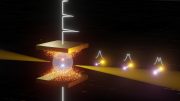
Light-Matter Particle Breakthrough Could Change Displays Forever

Elemental Surprise: Physicists Discover a New Quantum State

Beyond Theory: Dual Topological Insulating States Found in Monolayer Material

Neutrinos Whisper Quantum Gravity Secrets From the South Pole

Unveiling the Invisible: How BREAD Is Redefining Dark Matter Searches

The Magnetic Twist: Hybrid Superconductors Unlock Quantum Computing Potential
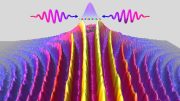
Electron Rhythms Expose the Heartbeat of Quantum Mechanics

Merons Magic: Unlocking the Secrets of Synthetic Antiferromagnets

Physics April 4, 2024
Unlocking the Secrets of Strength Through 3D Crack Analysis
By capturing a rare glimpse into three-dimensional crack formation in brittle solids, EPFL researchers have found that complex cracks require more energy to advance than…

Physics April 3, 2024
Redefining Quantum Communication: Researchers Have Solved a Foundational Problem in Transmitting Quantum Information
Quantum electronics represents a significant departure from conventional electronics. In traditional systems, memory is stored in binary digits. In contrast, quantum electronics utilizes qubits for…

Physics April 2, 2024
Physicists Discover a Quantum State With a New Type of Emergent Particles: Six-Flux Composite Fermions
If the fractional quantum Hall regime were a series of highways, these highways would have either two or four lanes. The flow of the two-flux…
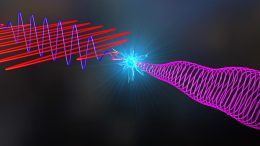
Physics April 1, 2024
Quantum Light’s “Goldilocks” Zone: Perfecting Elliptical Polarization
A new study by JILA introduces a straightforward method for generating elliptically polarized light, essential for advanced material research, challenging previous theoretical limitations. In a…

Unveiling the Thorium Nuclear Clock and Its Time-Twisting Secrets
A new and more precise way of measuring time is the aim of an international research project in which Würzburg physicist Adriana Pálffy-Buß is involved….

Physics March 31, 2024
Pushing the Limit of the Periodic Table – “Superheavy” Elements Challenge Theory
Scientists from Massey University in New Zealand, the University of Mainz in Germany, Sorbonne University in France, and the Facility for Rare Isotope Beams (FRIB)…

Physics March 30, 2024
The Muon Mystery: How a Decimal Place Could Redefine Physics
The researchers identified the origin of discrepancies in recent predictions of the muon’s magnetic moment. Their findings could contribute to the investigation of dark matter…

From Theory to Reality: Graviton-like Particles Found in Quantum Experiments
The results, continuing the legacy of late Columbia professor Aron Pinczuk, are a step toward a better understanding of gravity. A team of scientists from…

Ancient Japanese Art Inspires Next-Gen Fusion Reactor Breakthrough
Scientists take advantage of imperfections in magnetic fields to enhance fusion plasma. In the Japanese art of Kintsugi, an artist takes the broken shards of…
- Undergraduate Programs
- Graduate Programs
- Concentrations
- Extracurricular Opportunities
Research Topics
- Research Groups
- Academic Leadership
- Graduate Students
- Administrative Staff
- Alumni Press Releases
- Get Involved
- Giving Opportunities
- Newsletters
- Recruit Students
- Academic Support
- Community Outreach
- Experience and Employment
- Mental Health Resources
- Student Organizations
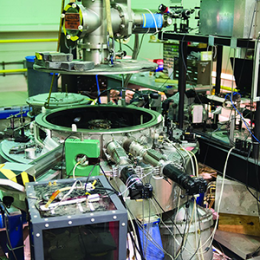
Astrophysics, Fusion and Plasma Physics
Cornell’s research programs in planetary astronomy, infrared astronomy, theoretical astrophysics, and radio astronomy are internationally recognized. Plasma physics is the science of electrically conducting fluids and high-temperature ionized gases. While the best-known research impetus is controlled fusion as a potential source of electric power, plasma physics also underlies many solar, astrophysical, and ionospheric phenomena as well as industrial applications of plasmas.
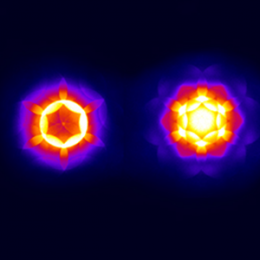
Nanoscience and Nanotechnology
Nanoscience, the behavior of physical systems when confined to near atomic, nanoscale ( 100 nm) dimensions together with the physical phenomena that occur at the nanoscale, is currently one of the most dynamic and rapidly developing areas of interdisciplinary research in applied physics.
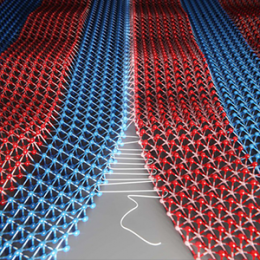
Condensed Matter and Materials Physics
Research topics in this diverse area range from innovative studies of the basic properties of condensed-matter systems to the nanofabrication and study of advanced electronic, optoelectronic, spintronic, and quantum-superconductor devices.
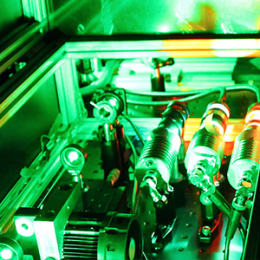
Energy Systems
The need for future renewable sources of energy and ways to minimize consumption is leading to a growing emphasis on new concepts for the generation, storage, and transportation of energy. Cornell faculty are involved in developing a wide range of energy-related materials, such as photovoltaic materials, thermoelectrics, advanced battery materials and catalysts, membranes and supports for mobile fuel cells. Research is also conducted on materials processing that minimizes environmental impact.
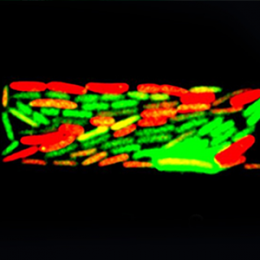
Biophysics is a broad field, ranging from fundamental studies of macromolecules or cells, through the design of state of the art diagnostic or medical tools. A number of AEP research groups are pushing the limits in biophysical studies by developing instruments that provide new insight into the physics that drives biological processes or developing new methods for manipulating biomolecules for biotechnological or biomedical applications.
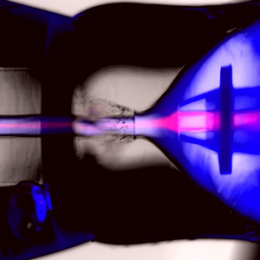
Microfluidics and Microsystems
Researchers in this field use their knowledge of microfluidics to create microsystems useful both in research and real-world applications in a variety of fields, including chemistry, biology, agriculture, and biomedical engineering.
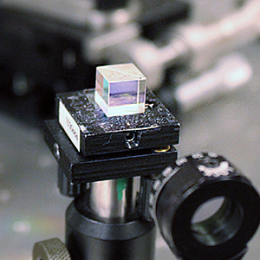
Optical Physics
Photonics researchers focus on the applications of the particle properties of light; optoelectronics has to do with the study and application of effects related to the interaction of light and electronic signals.
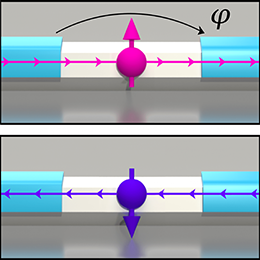
Quantum Information Science
QIS research studies the application of quantum physics to information science and technology. AEP has research groups spanning quantum sensing, communications, simulation, and computing, with experimental approaches including superconducting circuits, trapped ions, photonics, and semiconductor devices.
- Utility Menu
Apply | Contact Us | Carol Davis Fund Anonymous Feedback to the Physics Chair

The Harvard Department of Physics and its collaborators are leaders in a broad spectrum of physics research, utilizing facilities and technologies that are continually being modified and improved with changing research interests and techniques. This provides students, postdoctoral fellows, and other research sholars with opportunities to work in first-class facilities at Harvard, both on individual investigator-led research projects and in scientific collaboration through a variety of research centers.
To learn more about research at our department, please explore the links at left.
- Faculty by Research Area
- Research Centers
- Research Scholar FAQs
- Useful Links for Research Scholars
- Scientific Ethics and Professional Integrity
416 Physics Topics & Ideas to Research
18 January 2024
last updated
Physics topics may include the complex systems of the universe, from the smallest particles to colossal galaxies. This field of study examines fundamental concepts, such as force, energy, and matter, extrapolating them into areas like quantum or relative mechanics. It also explores thermodynamics, revealing the intriguing principles behind heat, work, and energy conversions. Some themes may vary from the mysteries of dark matter and energy in cosmology to the resonating string theories in theoretical physics. Moreover, the world of semiconductors in solid-state physics presents a spectrum of interconnected topics. In turn, the essential laws of physics provide the basis for almost all scientific research, offering profound insights into the natural world and shaping human understanding of how everything in the universe behaves and interacts.
Cool Physics Topics
- Quantum Entanglement and Its Potential Applications
- Harnessing Solar Energy: Next-Generation Photovoltaic Cells
- Plasma Physics and Controlled Fusion Energy
- The Role of Physics in Climate Change Models
- Dark Matter and Dark Energy: Unveiling the Universe’s Mysteries
- Astrophysics: Formation and Evolution of Black Holes
- Implications of Superconductivity in Modern Technology
- Roles of Biophysics in Understanding Cellular Mechanisms
- Theoretical Physics: The Quest for Quantum Gravity
- Nanotechnology: Manipulating Matter at the Atomic Scale
- Cosmic Microwave Background Radiation and the Big Bang Theory
- The Uncertainty Principle and Its Philosophical Consequences
- Exploring Exoplanets: Physics Beyond Our Solar System
- Advances in Optics: From Microscopy to Telecommunications
- Gravitational Waves: Probing the Fabric of Spacetime
- Neutrino Physics: Studying the Universe’s Ghost Particles
- Entropy and Time’s Arrow: Understanding Thermodynamics
- Applications of Particle Physics in Medicine
- Physics of Semiconductors and the Evolution of Computing
- Exploring String Theory and Multidimensional Realities
- Relativity Theory: Spacetime Curvature and Gravitational Lenses
- Quantum Computing: Bridging Physics and Information Technology
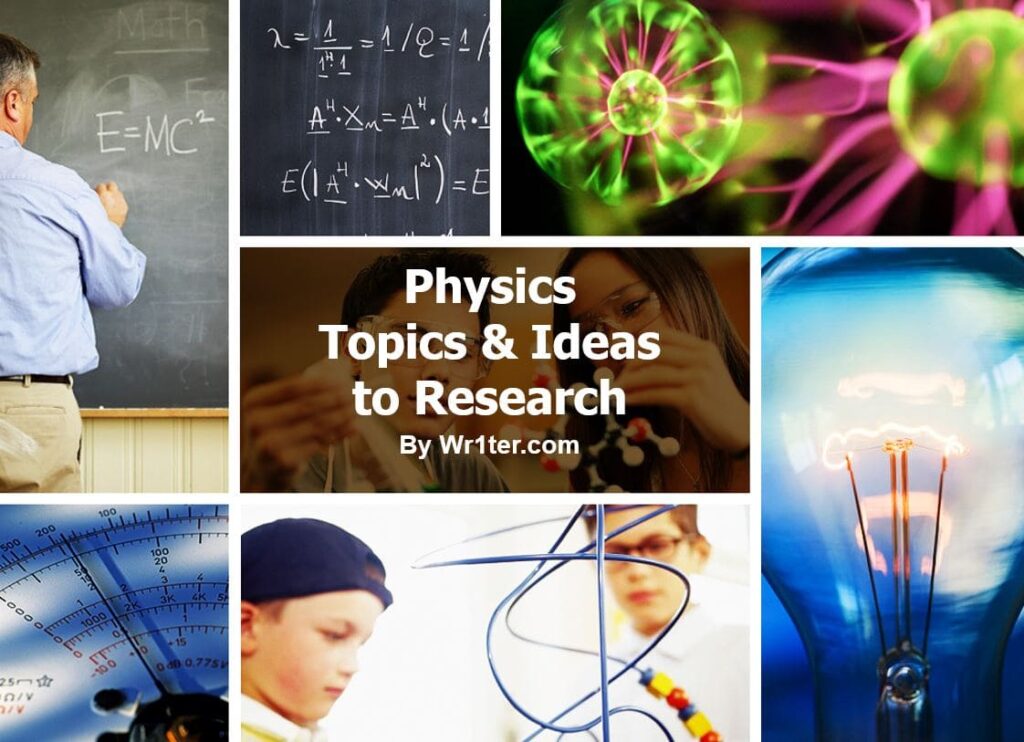
Easy Physics Topics
- Antimatter: Understanding its Properties and Possible Uses
- Physics of Chaos and Nonlinear Dynamical Systems
- Condensed Matter Physics: Unveiling the Behavior of Phases of Matter
- Science of Acoustics: Understanding Sound Phenomena
- Roles of Physics in Developing Advanced Materials
- Synchrotron Radiation: Tools and Techniques in Research
- Particle Accelerators: Probing the Quantum World
- Theoretical Predictions and Experimental Tests in Quantum Mechanics
- Nuclear Fusion: The Physics of a Star’s Energy Production
- The Holographic Principle: A Revolution in Quantum Physics?
- Biomechanics: Understanding the Physics of Life Movements
- Exploring the Physics of Supermassive Black Holes
- Magnetism: From Quantum Spin to Industrial Applications
- Laser Physics: Principles and Cutting-Edge Applications
- Advances in Cryogenics and Low-Temperature Physics
- The Physics of Flight: From Birds to Airplanes
- Quantum Field Theory and the Nature of Reality
- Modern Cosmology: Inflation and the Cosmic Structure
- Probing Subatomic Particles in High-Energy Physics
- Physics of Fluid Dynamics: From Blood Flow to Weather Systems
- The Grand Unified Theory: Bridging Fundamental Forces
- Quantum Cryptography: Ensuring Information Security
- Photonic Crystals and Their Applications in Telecommunication
Physics Research Paper Topics for High School
- Exploring the Mysteries of Dark Matter and Dark Energy
- Quantum Entanglement: Unraveling the Enigma
- Nanotechnology: The Physics of the Incredibly Small
- Black Holes: Understanding Gravity’s Ultimate Victory
- Time Travel: Exploring its Possibility in Physics
- Particle Physics: A Closer Look at the Higgs Boson
- Waves and Resonance: The Science Behind Vibrations
- Antimatter: The Mirror Image of Normal Matter
- Superconductivity: Exploring the Role of Temperature
- Effects of Nuclear Physics on Medical Imaging Technology
- The Theory of Everything: Unifying the Fundamental Forces
- Superstring Theory: The Quest for Unification
- Chaos Theory: A Journey Through Nonlinear Dynamics
- Radioactivity: The Science Behind Nuclear Decay
- Examining the Physical Properties of Non-Newtonian Fluids
- Magnetic Monopoles: A Missing Piece in Electromagnetism?
- Quantum Field Theory: The World of Subatomic Particles
- Physics of Climate Change: Understanding Global Warming
- Thermodynamics: The Science of Heat and Energy Transfers
Physics Research Paper Topics for College Students
- Unveiling the Mysteries of Quantum Entanglement
- Implications of Zero-Point Energy: A Look Into Vacuum Fluctuations
- Examining the Principles and Potential of Nuclear Fusion
- Harnessing Antimatter: Theoretical Approaches and Practical Limitations
- Tracing Cosmic Rays: Sources, Propagation, and Interaction with Matter
- Advanced Gravitational Waves: Detection and Significance
- Rethinking Dark Matter: Contemporary Views and Hypotheses
- Probing Planetary Physics: Dynamics in Our Solar System
- Exploring the Physics of Black Holes: Beyond the Event Horizon
- Thermodynamics in Nanoscale Systems: Deviations From Classical Rules
- Computational Physics: The Impact of Machine Learning on Physical Research
- Spintronics: Revolutionizing Information Technology
- Accelerators in Medicine: Using Particle Physics for Cancer Treatment
- The Influence of Physics on Climate Change Modeling
- Neutrino Oscillations: Exploring the Ghost Particles
- Quantum Computing: Bridging the Gap Between Physics and Information Technology
- Dark Energy and the Accelerating Universe: Current Understanding
- Gauge Theories in Particle Physics: A Deep Dive
- The Holographic Principle: The Universe as a Hologram
- The Role of Physics in Renewable Energy Technologies
- Time Travel Theories: Fact or Fiction?
- Implications of String Theory in Modern Physics
Physics Research Paper Topics for University
- Metamaterials: Creating the Impossible in Optics and Acoustics
- Fluid Dynamics in Astrophysics: Stars, Galaxies, and Beyond
- Tackling Turbulence: The Last Great Problem in Classical Physics
- The Casimir Effect: Unearthing Quantum Force in the Vacuum
- Superconductivity: New Frontiers and Applications
- Advances in Biophysics: Cellular Mechanisms to Organismal Systems
- The Physics of Spacecraft Propulsion: Ion Drives and Beyond
- Supersymmetry: The Unfulfilled Promise of the Universe
- Relativity and GPS: The Unseen Influence of Physics in Everyday Life
- Topological Insulators: Quantum Phenomena in Solid State Physics
- The Future of Photonics: Powering the Next Generation of Technology
- Atomic Clocks: The Intersection of Quantum Mechanics and Relativity
- Quantum Field Theory: A Modern Understanding
- Electromagnetism in Biological Systems: Understanding Bioelectricity
- The Kardashev Scale: A Framework for Advanced Civilizations
- Harnessing the Sun: The Physics of Solar Energy
- M-Theory: The Unifying Theory of Everything
- Bell’s Theorem: Debunking Local Realism
- Quantum Cryptography: Security in the Age of Quantum Computers
- Geophysics: Understanding the Earth’s Core and Plate Tectonics
Physics Research Paper Topics for Master’s & Ph.D.
- Quantum Entanglement: Unraveling the Spooky Action at a Distance
- Harnessing Fusion Power: Prospects for Unlimited Clean Energy
- Gravitational Waves: Detecting Ripples in Spacetime
- The Nature of Black Holes and Singularities
- Time Dilation and Its Applications in Modern Physics
- Investigating the Particle-Wave Duality: A Deeper Look Into Quantum Mechanics
- The Physics of Superconductors: Transitioning From Theory to Practical Applications
- Hawking Radiation: From Theory to Possible Observations
- Evolution of the Universe: A Closer Look at the Big Bang Theory
- Exploring the Higgs Field: Implications for Particle Physics
- Nanotechnology in Physics: The Promising Path Toward the Future
- String Theory and the Quest for a Theory of Everything
- The Role of Physics in Climate Change Modelling
- Understanding Neutrinos: Ghost Particles of the Universe
- The Fundamentals of Chaos Theory: Applications in Modern Physics
- Quantum Computing: Breaking Down the Physics Behind the Future of Computation
- Exploring The Fourth Dimension: A Journey Beyond Time
- Astrophysics and the Study of Exoplanets: Seeking Alien Life
- Quantum Field Theory: Bridging Quantum Mechanics and Special Relativity
- Understanding Quantum Tunneling: Applications and Implications
- Study of Quarks: Subatomic Particles and the Strong Force
- Biophysics and the Mechanics of Cellular Structures
- Magnetic Monopoles: Hunting for the Missing Entities in Quantum Theory
Physics Research Topics on Classical Mechanics
- Understanding Kepler’s Laws and Their Practical Applications
- The Role of Energy Conservation in Mechanical Systems
- Implications of Newton’s Third Law on Engineering Designs
- Exploring Oscillatory Motion: Springs and Pendulums
- Effects of Friction Forces on Everyday Objects
- Stability of Rotational Systems in Aerospace Engineering
- Interpreting Physical Phenomena Using Vector Mechanics
- Influence of Classical Mechanics on Modern Architecture
- Application of Momentum Conservation in Collision Analysis
- Kinematics of Complex Systems: An In-Depth Study
- Elasticity and Its Impact on Material Science
- Newtonian Physics in Contemporary Game Design
- The Art of Fluid Dynamics: Concepts and Applications
- Gyroscopes and Their Applications in Modern Technologies
- Applications of Torque in Mechanical Engineering
- Relevance of Angular Momentum in Astrophysics
- The Science Behind Musical Instruments: A Mechanical Perspective
- Diving Into the Parallels Between Classical and Quantum Mechanics
- Exploring Parabolic Trajectories in Projectile Motion
- Dynamics of Multi-Body Systems in Space Exploration
Research Topics for Physics of Materials
- Analysis of Quantum Behavior in Superconductors
- Predictive Modelling of Phase Transitions in Crystalline Structures
- Examination of Electron Mobility in Semi-Conductive Materials
- Study of High-Temperature Superconductivity Phenomena
- Mechanical Properties of Novel Metallic Alloys
- Graphene: Exploring its Remarkable Electronic Properties
- Optimization of Energy Storage in Advanced Battery Materials
- Ferroelectric Materials: Unraveling their Unique Electrical Properties
- Assessing Durability of Construction Materials Under Environmental Stressors
- Properties and Potential Applications of Topological Insulators
- Investigation into Multiferroic Materials: Challenges and Opportunities
- Dynamic Response of Materials under High-Strain Rates
- Nanomaterials: Understanding Size-Dependent Physical Properties
- Harnessing Thermoelectric Materials for Energy Conversion
- Photonic Crystals: Manipulation of Light Propagation
- Exploring Amorphous Solids: From Metallic Glasses to Plastics
- Investigations into Magnetocaloric Materials for Eco-Friendly Refrigeration
- Neutron Scattering in the Study of Magnetic Materials
- Probing the Anisotropic Nature of Composite Materials
- Characterization of Disordered Materials Using Spectroscopic Techniques
- Roles of Surface Physics in Material Science
Physics Research Topics on Electrical Engineering
- Influence of Artificial Intelligence on Modern Power Systems
- Radio Frequency Identification (RFID): Advancements and Challenges
- Improving Transmission Efficiency Through Smart Grids
- Developments in Electric Vehicle Charging Infrastructure
- Optical Fiber Technology: The Future of Communication
- Interplay between Solar Power Engineering and Material Science
- Harnessing the Potential of Superconductors in Electrical Engineering
- Li-Fi Technology: Lighting the Way for Data Communication
- Innovations in Energy Storage: Beyond Lithium-Ion Batteries
- Designing Efficient Power Electronics for Aerospace Applications
- Exploring the Boundaries of Microelectronics With Quantum Dots
- Robotic Automation: Electrical Engineering Perspectives
- Power System Stability in the Era of Distributed Generation
- Photovoltaic Cells: Advances in Efficiency and Cost-Effectiveness
- Investigating the Feasibility of Wireless Power Transfer
- Unmanned Aerial Vehicles (UAVs): Power Management and Energy Efficiency
- Quantum Entanglement: Implications for Information Transmission
- Fuel Cells: Exploring New Frontiers in Electrical Power Generation
- Machine Learning Applications in Predictive Maintenance of Electrical Systems
- Neural Networks and their Role in Electrical Circuit Analysis
Optical Physics Research Topics
- Exploring Quantum Optics: Unveiling the Peculiarities of Light-Particle Interactions
- Harnessing the Power of Nonlinear Optics: Potential Applications and Challenges
- Fiber Optic Technology: Influencing Data Transmission and Telecommunication
- The Role of Optics in Modern Telescopic Innovations: An Analytical Study
- Polarization of Light: Understanding the Physical and Biological Applications
- Unfolding the Mystery of Optical Tweezers: Manipulation and Measurement at the Microscale
- Lasing Mechanisms: Insights Into the Evolution and Operation of Lasers
- Waveguides and Their Crucial Role in Integrated Optics: A Comprehensive Study
- Optical Illusions: Revealing the Underlying Physics and Perception Aspects
- Biophotonics: The Intersection of Optics and Biomedicine
- Exploiting Optical Metamaterials: The Pathway to Invisible Cloaking Devices
- Optical Holography: Unearthing the Potential for 3D Visualization and Display Systems
- Investigation of Optical Solitons: Nonlinear Pulses in Fiber Optic Communications
- Plasmonics: Harnessing Light With Nanostructures for Enhanced Optical Phenomena
- Advances in Spectroscopy: Optical Techniques for Material Analysis
- The Physics behind Optical Coherence Tomography in Medical Imaging
- Optical Vortices and Their Role in High-Capacity Data Transmission
- Ultrafast Optics: Time-Resolved Studies and Femtosecond Laser Applications
- In-Depth Review of Optical Trapping and Its Potential in Nanotechnology
- Optical Parametric Oscillators: Applications in Spectroscopy and Laser Technology
- Theoretical Perspectives on Photonic Crystals and Band Gap Engineering
Physics Research Topics on Acoustics
- Exploration of Ultrasonic Waves in Medical Imaging and Diagnostics
- Propagation of Sound in Various Atmospheric Conditions
- Impacts of Acoustics on Architectural Design Principles
- Innovative Approaches to Noise Cancellation Technologies
- The Role of Acoustics in Underwater Communication Systems
- Sonic Boom Phenomena: Causes and Effects
- Effects of Acoustic Resonance in Musical Instruments
- Influence of Material Properties on Sound Absorption
- Harnessing the Power of Sound: Acoustic Levitation Research
- Relationship Between Acoustic Ecology and Urban Development
- Evaluating the Principles of Acoustic Metamaterials
- Acoustic Thermometry: Precision in Temperature Measurement
- Potential Applications of Phononic Crystals in Acoustics
- Deciphering Dolphin Communication: Bioacoustics in Marine Life
- Development and Improvement of Acoustic Emission Techniques
- Thermoacoustic Engines and Refrigeration: An Emerging Technology
- Investigating the Psychoacoustic Properties of Sound
- Impacts of Acoustic Treatment in Home Theatres and Studios
- Evaluating the Effectiveness of Sonar Systems in Submarine Detection
- Ultrasound Applications in Non-Destructive Testing and Evaluation
Physics Research Topics on Thermodynamics
- Investigating the Role of Thermodynamics in Nanotechnology Development
- Entropy Production: A Deep Dive into Non-Equilibrium Thermodynamics
- Impacts of Thermodynamics on Energy Conservation Practices
- Quantum Thermodynamics: Bridging Quantum Mechanics and Traditional Thermodynamics
- Advanced Materials in Heat Engines: A Thermodynamic Perspective
- Applications of Thermodynamics in Renewable Energy Technology
- Exploring Thermodynamic Limits of Computation: Theoretical and Practical Aspects
- Unveiling the Mysteries of Black Hole Thermodynamics
- Influence of Thermodynamics in Climate Change Modelling
- Exploiting Thermodynamics for Efficient Spacecraft Heat Management
- Understanding Biological Systems Through the Lens of Thermodynamics
- Applying Thermodynamics to Predict Geophysical Phenomena
- Thermodynamics in Food Processing: Effects on Nutrient Preservation
- Biogeochemical Cycles: An Insight From Thermodynamics
- Roles of Thermodynamics in Understanding Supernova Explosions
- Thermodynamics in Modern Architecture: Energy-Efficient Building Designs
- Thermoelectric Materials: Harnessing Thermodynamics for Power Generation
- Roles of Thermodynamics in Efficient Resource Recovery From Waste
- Thermodynamics and Its Implications in the Formation of Stars
- Exploring Thermodynamics in Quantum Information Theory
Particle Physics Research Topics
- Unraveling the Mysteries of Quark Structures in Baryonic Matter
- The Enigma of Neutrino Oscillations: New Discoveries
- String Theory Applications in Particle Physics: A New Horizon
- Dark Matter Particles: Unseen Influences on Cosmic Structures
- The Higgs Field and Its Implications for the Standard Model
- Lepton Family: A Comprehensive Study of Their Unique Properties
- Quantum Chromodynamics: Decoding the Strong Force
- The Role of W and Z Bosons in Electroweak Interactions
- Antiparticle Behavior and Its Ramifications for Symmetry
- Detecting Supersymmetry: A Paradigm Shift in Particle Physics?
- Insights Into Graviton: Hunting the Quantum of Gravity
- Probing the Exotic: Search for Hypothetical Particles
- Flavor Changing Processes in the Quark Sector: An Analytical Approach
- Precision Measurements of the Top Quark: A Key to New Physics
- Pentaquark Particles: A Fresh Perspective on Hadronic Matter
- Examining the Asymmetry Between Matter and Antimatter
- Gluons and Confinement: Probing the Fabric of Quantum Chromodynamics
- Proton Decay: GUTs, Supersymmetry, and Beyond
- Unveiling the Secrets of Cosmic Ray Particles
- Meson Spectroscopy: Understanding Hadrons Better
- Scalar Fields and Inflation: A Quantum Field Theory Perspective
Statistical Physics Research Topics
- Exploring the Second Law of Thermodynamics in Cosmic Evolution
- Investigating the Role of Entropy in the Black Hole Information Paradox
- Understanding Statistical Mechanics in Biophysical Systems
- Analyzing Temperature’s Impact on Quantum Spin Chains
- Diving Into Phase Transitions in Quantum Fields
- Quantum Fluctuations and Their Statistical Significance
- Applications of Statistical Physics in Neural Networks
- Investigating the Universality Classes in Critical Phenomena
- Revealing the Role of Statistical Physics in Ecosystem Dynamics
- Fluctuation Theorems: A Study of Non-Equilibrium Systems
- Statistical Physics’ Approach to Understanding Traffic Flow Dynamics
- Non-Equilibrium Statistical Mechanics in Living Systems
- Deciphering the Puzzle of Quantum Entanglement Using Statistical Methods
- Research on Spin Glasses and Disorder in Statistical Physics
- Thermodynamics in Small Systems: A Statistical Physics Approach
- Fractal Analysis: Its Impact on Statistical Physics
- Harnessing the Power of Statistical Physics for Climate Modeling
- Introducing Quantum Field Theory to Statistical Physics Studies
- Investigating Energy Landscapes in Protein Folding
- Simulating Turbulence Using Concepts of Statistical Physics
Atomic Physics Research Topics
- Quantum Entanglement and Its Impact on Information Transfer
- Exploring the Properties of Exotic Atoms
- Manipulating Matter: The Potential of Cold Atoms
- Unveiling the Secrets of Quantum Decoherence
- Probing Quantum Tunneling: From Theory to Practical Applications
- Atomic Collisions and Their Consequences in Astrophysics
- Advancements in Atomic Clock Technology and Precision Timekeeping
- Harnessing the Power of Quantum Computing With Atomic Physics
- Advancements in Atom Interferometry and Precision Measurements
- Evaluating the Influence of Atomic Physics on Biological Systems
- Atomic Physics Applications in Emerging Technologies
- Unlocking the Mysteries of Atomic Spectroscopy
- Delving into the World of Ultracold Atoms and Bose-Einstein Condensates
- The Role of Atomic Physics in Climate Change Studies
- Shedding Light on Dark Matter: Atomic Physics Approaches
- Innovations in Controlled Nuclear Fusion Through Atomic Physics
- Electron Capture and Beta Decay: The Intricacies of Weak Force
- Quantum Magnetism and Its Influence on Atomic Structures
- Theoretical Frameworks for Describing Atomic Structure and Behavior
- The Future of Nanotechnology: Role of Atomic Physics
- Understanding Atomic Physics Role in Quantum Cryptography
- Fundamental Symmetries: Atomic Physics Perspectives and Tests
Physics Research Topics on Quantum Mechanics
- Investigating the Quantum Behavior of Superconducting Circuits
- Exploring the Applications of Quantum Entanglement in Communication Systems
- Analyzing the Role of Quantum Mechanics in Biological Systems
- Developing Quantum Algorithms for Solving Complex Optimization Problems
- Understanding Quantum Tunneling in Nanostructures
- Investigating Quantum Coherence in Macroscopic Systems
- Exploring the Role of Quantum Mechanics in Quantum Computing
- Analyzing the Quantum Properties of Photons in Quantum Information Processing
- Developing Quantum Sensors for High-Precision Measurements
- Investigating the Quantum Mechanics of Quantum Dots in Optoelectronic Devices
- Analyzing the Quantum Mechanics of Spintronics for Information Storage and Processing
- Exploring the Role of Quantum Mechanics in Quantum Cryptography
- Investigating the Quantum Properties of Bose-Einstein Condensates
- Developing Quantum Simulators for Studying Complex Quantum Systems
- Analyzing the Quantum Mechanics of Topological Insulators
- Exploring Quantum Chaos and its Applications in Quantum Mechanics
- Investigating the Quantum Mechanics of the Quantum Hall Effect
- Analyzing the Quantum Properties of Quantum Gravity
- Exploring the Role of Quantum Mechanics in Quantum Sensing and Metrology
- Investigating the Quantum Mechanics of Quantum Optics
Nuclear Physics Research Topics
- Quantum Tunneling in Nuclear Reactions
- Neutron Stars: Structure and Properties
- Nuclear Fusion as a Clean Energy Source
- Investigating the Role of Mesons in Nuclear Forces
- Nuclear Shell Model: Understanding Nucleus Stability
- Proton-Proton Collisions in High-Energy Physics
- Nuclear Fission: Mechanisms and Applications
- Theoretical Analysis of Nuclear Decay Processes
- Particle Accelerators for Nuclear Physics Research
- The Quark-Gluon Plasma: Experimental Studies
- Superheavy Elements and Their Synthesis
- Nuclear Magnetic Resonance Spectroscopy in Materials Science
- Neutrino Oscillations and Mass Hierarchy
- Isotope Separation Techniques for Medical and Industrial Applications
- Exotic Nuclear Shapes: Triaxial and Hyperdeformed Nuclei
- Nuclear Data Evaluation and Uncertainty Analysis
- Studying Nuclear Reactions in Supernovae
- Exploring Nuclear Isomerism for Quantum Computing
- Nuclear Waste Management and Disposal Strategies
- Giant Resonances in Nuclear Physics
Physical Geography Topics to Write About
- Solar Radiation’s Impact on Geographical Landform Evolution
- Oceanic Currents and Their Role in Coastal Erosion
- Atmospheric Pressure Interactions and Mountain Formation
- Tectonic Plate Movements’ Influence on Geographical Features
- Gravity’s Contribution to Geographical Landscape Formation
- Climate Change Effects on Glacial Retreat and Polar Geography
- Wind Patterns and Dune Formation in Deserts
- River Networks’ Dynamics and Fluvial Geomorphology
- Volcanic Activity and Island Formation
- Magnetic Fields and Geomagnetic Reversals in Paleomagnetism
- Earthquakes’ Impact on Geographical Landforms and Seismic Hazards
- Rainfall Patterns and Soil Erosion in Agricultural Landscapes
- Geothermal Energy’s Role in Hydrothermal Features
- Tsunamis’ Effects on Coastal Landforms and Human Settlements
- Earth’s Magnetic Field and the Auroras
- Eolian Processes and Desertification in Arid Landscapes
- Gravity Waves’ Influence on Atmospheric Circulation and Climate Patterns
- River Diversions and Delta Formation
- Climate Change and Coral Reef Degradation
- Ice Sheets’ Dynamics and Sea Level Rise
- Karst Processes and Cave Formation
Astrophysics Topics for a Research Paper
- Quantum Effects in Stellar Evolution
- Gravitational Waves From Binary Neutron Star Mergers
- Cosmic Microwave Background Anisotropy Analysis
- Supernova Nucleosynthesis and Element Formation
- Dark Matter Distribution in Galaxy Clusters
- Magnetic Fields in Protostellar Disks
- Exoplanet Atmospheres and Habitability
- Black Hole Dynamics in Galactic Centers
- High-Energy Particle Acceleration in Active Galactic Nuclei
- Gamma-Ray Burst Progenitor Identification
- Interstellar Medium Turbulence and Star Formation
- Neutrino Oscillations in Supernova Explosions
- Cosmic Ray Propagation in the Galactic Magnetic Field
- Stellar Populations and Galactic Archaeology
- Stellar Pulsations and Variable Stars in Globular Clusters
- Dusty Torus Structure in Active Galactic Nuclei
- Planetary Formation in Binary Star Systems
- Primordial Magnetic Fields and Early Universe Magnetogenesis
- Neutron Star Equation of State Constraints from Pulsar Timing
- Galactic Chemical Evolution and Metal Enrichment
Theoretical Physics Topics to Research
- Quantum Entanglement in Multi-Particle Systems
- Gravitational Waves and Black Hole Mergers
- Emergent Phenomena in Condensed Matter Physics
- Nonlinear Dynamics and Chaos in Physical Systems
- Symmetry Breaking and Phase Transitions
- Topological Insulators and Their Applications
- Quantum Computing and Information Theory
- Cosmological Inflation and the Early Universe
- Quantum Field Theory and Particle Interactions
- Time Reversal Symmetry in Quantum Mechanics
- Black Hole Thermodynamics and Hawking Radiation
- Quantum Simulation and Quantum Many-Body Systems
- Dark Matter and Its Detectability
- Superconductivity and Superfluidity
- Information-Theoretic Approaches to Quantum Gravity
- Magnetic Monopoles and Their Role in Particle Physics
- High-Energy Physics and Collider Experiments
- Quantum Hall Effect and Topological Order
- Quantum Optics and Quantum Information Processing
- Neutrino Physics and Neutrino Oscillations
- Fractals and Self-Similarity in Physical Systems
To Learn More, Read Relevant Articles
801 chemistry research topics & interesting ideas, 484 sports research topics & good ideas.
Physical Review Research
- Collections
- Editorial Team

Welcoming the Full Spectrum of Research
Physical Review Research is a fully open access, peer-reviewed, international, multidisciplinary journal covering all research topics of interest to the physics community.
The open access publishing model supports the aim of the journal—to broadly disseminate high-quality research from all of physics, the physical sciences, and interdisciplinary areas to a global audience. Our goal is to initiate conversations across traditional boundaries, facilitate potential new collaborations, and enable future discoveries.
The Experience You Value and Quality You Trust
PRResearch authors and readers will benefit from the rigorous peer review and high visibility that have defined the Physical Review author experience for decades.
The acceptance criteria for PRResearch are aligned with those of other long-established journals in the family, such as Physical Review A , B , C , D , and E . Manuscripts directly submitted, or transferred from another journal such as PRX or PRL, to PRResearch should:
- Present important and novel results that advance a particular field of research
- Generate interest for readers with a connection to physics
- Represent an authoritative and substantive addition to the body of literature
- Explore the subject matter comprehensively and thoroughly
By Scientists, For Scientists
Like all Physical Review journals, PRResearch is shaped by scientists to serve the physics community. This commitment ensures that its mission and standards prioritize the needs of researchers.
Why Publish in PRResearch?
Visibility and broad dissemination.
PRResearch authors will gain value through the high visibility and broad dissemination of their work by publishing in a fully open access publication that covers the whole spectrum of physics, physical sciences, and interdisciplinary research. In addition to reaching a general and diverse audience of readers, your research will benefit from increased recognition and impact through a number of features:
Open Access
The fully open access publishing model increases readership by making all articles immediately free to read, and allows reuse by readers anywhere in the world under a CC-BY 4.0 International license.
Editors’ Suggestions
Select papers will be chosen to direct readers to interesting and well-written articles in areas of research beyond their usual area of focus. On average these featured papers will receive more downloads and citations.
Featured in Physics
Papers of particular interest to a broad readership will receive additional coverage by being featured in the online magazine Physics , which provides news and expert commentary about research for the physics community.
Interest-generating papers will be promoted on the journal website, to journalists, and via social media, which increases the likelihood your research will be covered by industry publications and the popular press.
Sign up to receive regular email alerts from Physical Review Research
- Forgot your username/password?
- Create an account
Article Lookup
Paste a citation or doi, enter a citation.
- Interesting
- Scholarships
- UGC-CARE Journals
Top 50 Emerging Research Topics in Physics
Explore the Fascinating Research Topics in Physics

Table of contents
1. quantum computing, 2. dark matter, 3. quantum gravity, 4. high-temperature superconductors, 5. neutrino physics, 6. exoplanets and astrobiology, 7. topological matter, 8. quantum simulation, 9. plasma physics, 10. gravitational waves, 11. black holes, 12. quantum sensors, 13. photonics and quantum optics, 14. materials science, 15. nuclear physics, 16. quantum thermodynamics, 17. high-energy particle physics, 18. quantum materials, 19. astrophysical neutrinos, 20. topological superconductors, 21. quantum information theory, 22. exotic particles, 23. 3d printing of advanced materials, 24. quantum biology, 25. quantum networks, 26. space-time crystal, 27. supersolidity, 28. soft matter physics, 29. dark energy, 30. quantum spintronics, 31. quantum field theory, 32. terahertz spectroscopy, 33. holography and ads/cft, 34. quantum cryptography, 35. quantum chaos, 36. mesoscopic physics, 37. quantum gravity phenomenology, 38. spin-orbit coupling, 39. optomechanics, 40. quantum metrology, 41. quantum phase transitions, 42. quantum chaos, 43. topological quantum computing, 44. superfluids and supersolids, 45. quantum key distribution, 46. quantum spin liquids, 47. topological insulators, 48. quantum artificial intelligence, 49. environmental physics, 50. acoustic and fluid dynamics.
Physics is a field that constantly evolves as researchers push the boundaries of our understanding of the universe. Over the years, countless ground-breaking discoveries have been made, from the theory of relativity to the discovery of the Higgs boson. In this article, iLovePhD will present you with the top 50 emerging research topics in physics, highlighting the frontiers of knowledge and the exciting possibilities they hold.

• Quantum algorithms for optimization problems • Quantum error correction and fault tolerance • Quantum machine learning and artificial intelligence

• Identifying dark matter particles • Dark matter and galaxy formation • New experimental techniques for dark matter detection
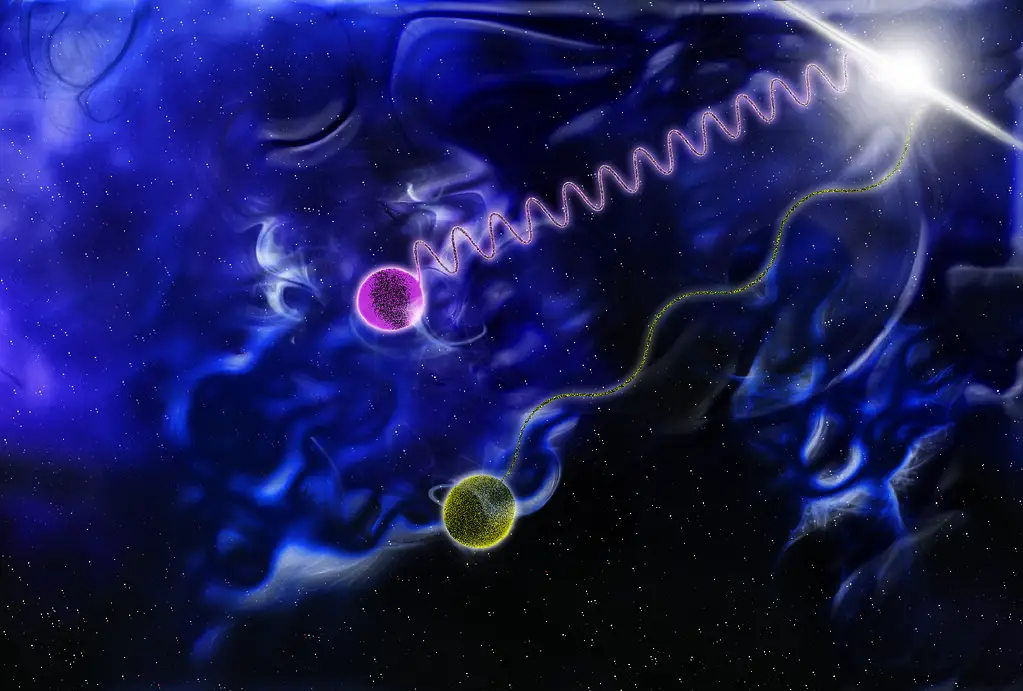
• String theory and its implications • Emergent space-time from quantum entanglement • Quantum gravity and black hole information paradox

• Understanding the mechanism behind high-temperature superconductivity • New materials and applications • Room-temperature superconductors
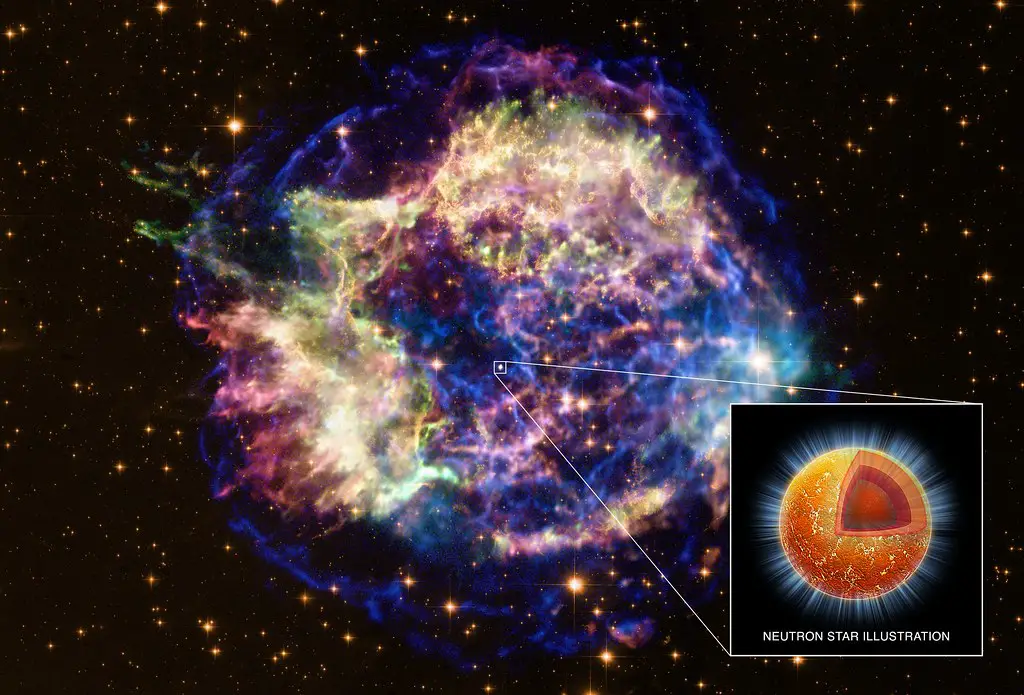
• Neutrino mass hierarchy and oscillations • Neutrinos in astrophysics and cosmology • Neutrinoless double beta decay
• Characterizing exoplanet atmospheres • Habitability and the search for life beyond Earth • The role of water in astrobiology
• Topological insulators and superconductors • Topological materials for quantum computing • Topological photonics
• Simulating complex quantum systems • Quantum simulation for materials science • Quantum simulators for fundamental physics
• Fusion energy and the quest for sustainable power • Space weather and its impact on technology • Nonlinear dynamics in plasmas
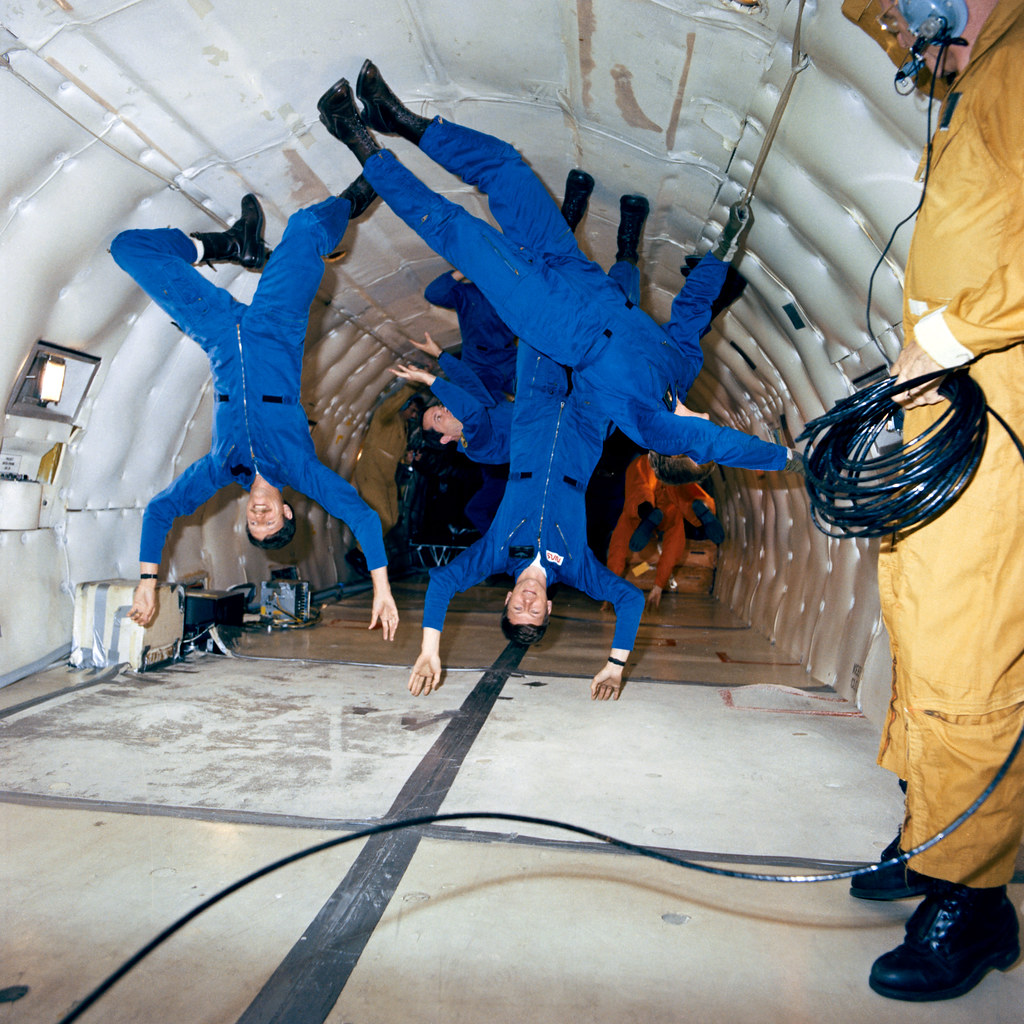
• Multi-messenger astronomy with gravitational waves • Probing the early universe with gravitational waves • Next-generation gravitational wave detectors
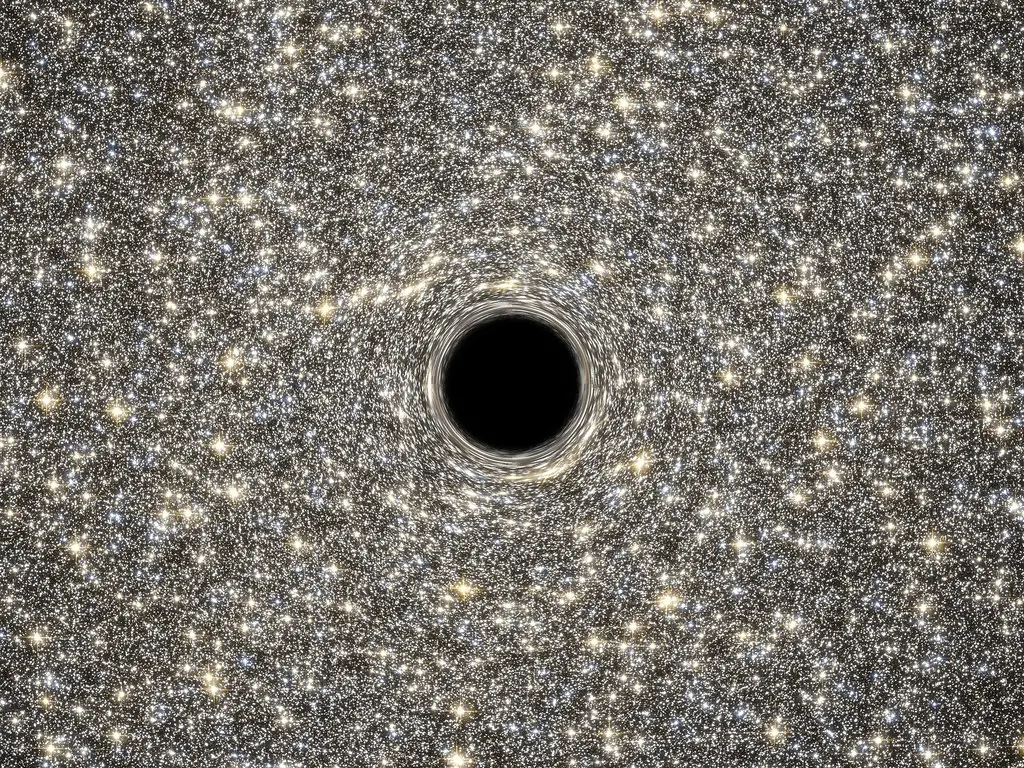
• Black hole thermodynamics and the information paradox • Observational techniques for studying black holes • Black hole mergers and their cosmic implications
• Quantum-enhanced sensing technologies • Quantum sensors for medical diagnostics • Quantum sensor networks
• Quantum communication and cryptography • Quantum-enhanced imaging and microscopy • Photonic integrated circuits for quantum computing
• 2D materials and their applications • Metamaterials and cloaking devices • Bioinspired materials for diverse applications
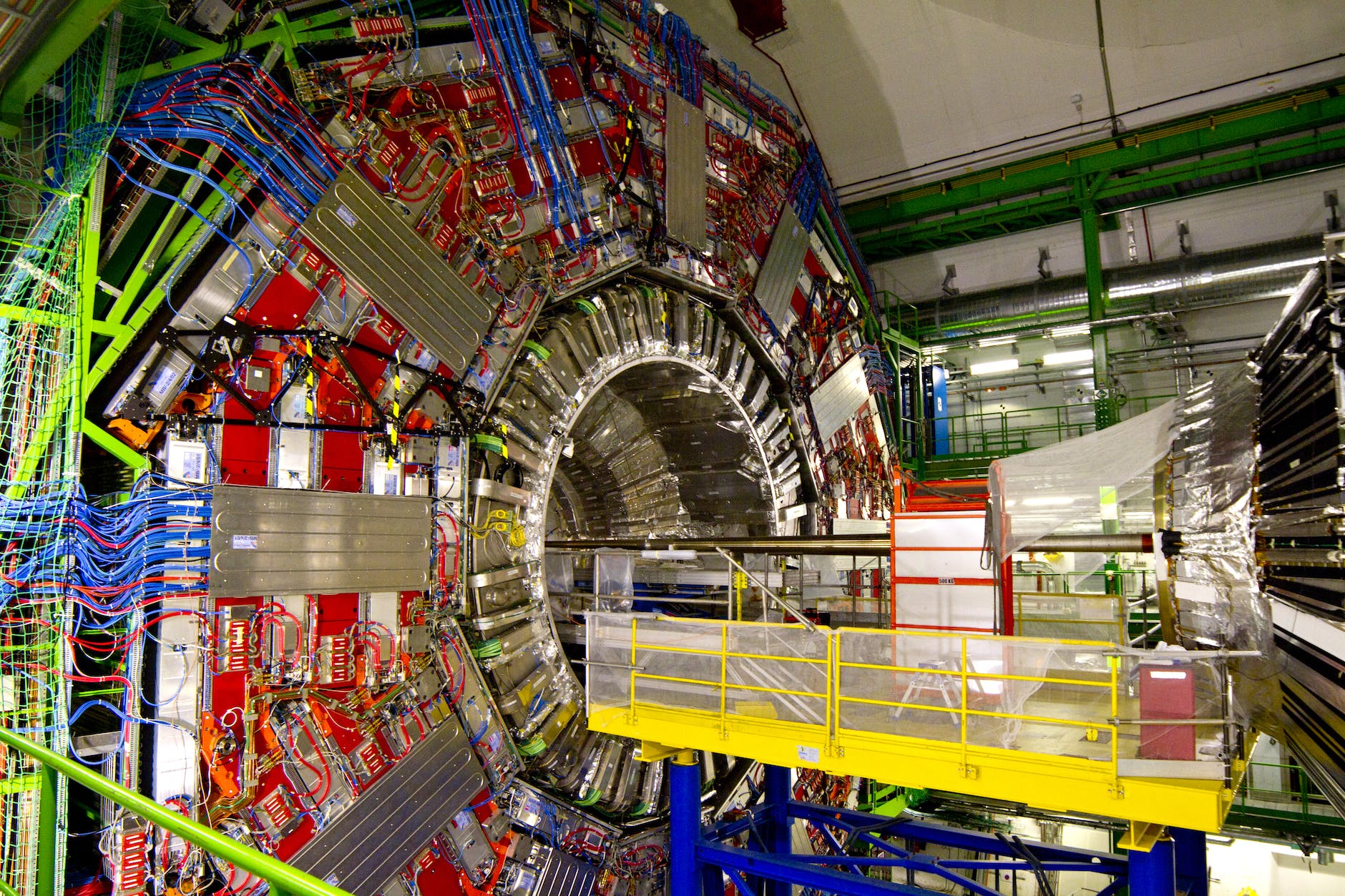
• Nuclear structure and reactions • Nuclear astrophysics and the origin of elements • Applications in nuclear medicine
• Quantum heat engines and refrigerators • Quantum thermodynamics in the quantum computing era • Entanglement and thermodynamics
• Beyond the Standard Model physics • Particle cosmology and the early universe • Future colliders and experiments
• Quantum phase transitions and exotic states of matter • Quantum criticality and its impact on materials • Quantum spin liquids
• Neutrinos from astrophysical sources • Neutrino telescopes and detection methods • Neutrinos as cosmic messengers
• Majorana fermions in condensed matter systems • Topological qubits for quantum computing • Topological superconductors in particle physics
• Quantum communication protocols • Quantum error correction and fault tolerance • Quantum algorithms for cryptography
• Search for axions and axion-like particles • Magnetic monopoles and their detection • Supersymmetry and new particles

• Customized materials with novel properties • On-demand manufacturing for aerospace and healthcare • Sustainable and recyclable materials
• Quantum effects in biological systems • Photosynthesis and quantum coherence • Quantum sensing in biological applications
• Quantum key distribution for secure communication • Quantum internet and global quantum connectivity • Quantum repeaters and entanglement distribution
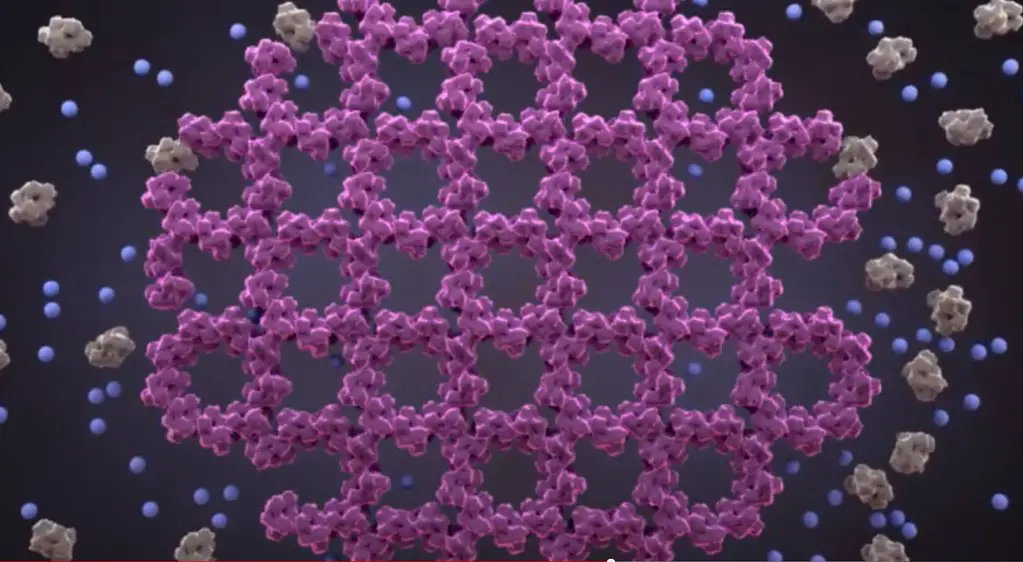
• Time crystals and their quantum properties • Applications in precision timekeeping • Space-time crystals in quantum information
• Theoretical models and experimental evidence • Quantum properties of supersolids • Supersolidity in astrophysical contexts
• Colloidal suspensions and self-assembly • Active matter and biological systems • Liquid crystals and display technologies
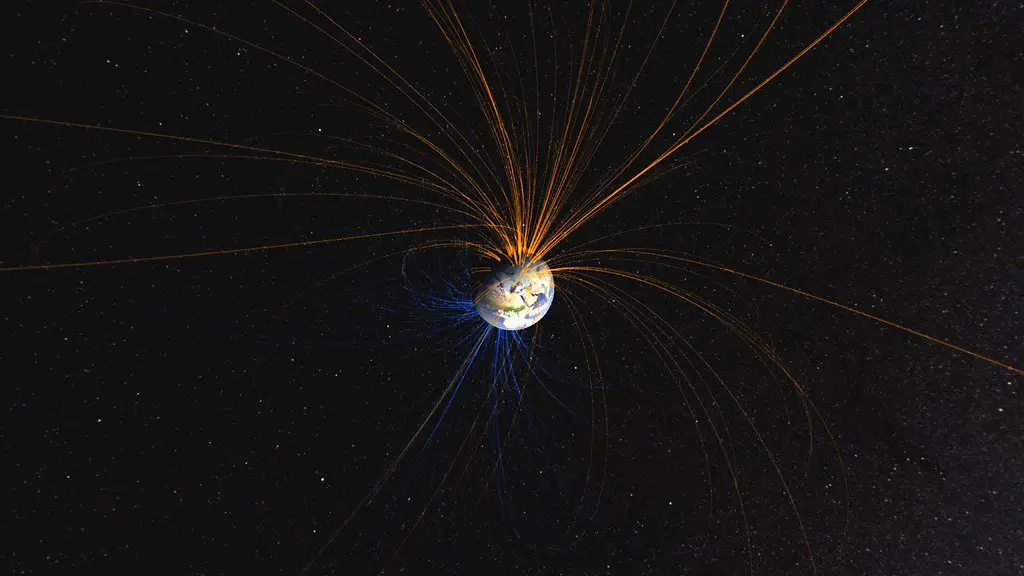
• Nature of dark energy and cosmic acceleration • Probing dark energy with large-scale surveys • Modified gravity theories
• Spin-based electronics for quantum computing • Spin transport and manipulation in materials • Quantum spin devices for information processing
• Conformal field theories and holography • Nonperturbative methods in quantum field theory • Quantum field theory in cosmology
• Terahertz imaging and sensing • Terahertz sources and detectors • Terahertz applications in healthcare and security
• Holography and black hole physics • AdS/CFT correspondence and quantum many-body systems • Holography in condensed matter physics
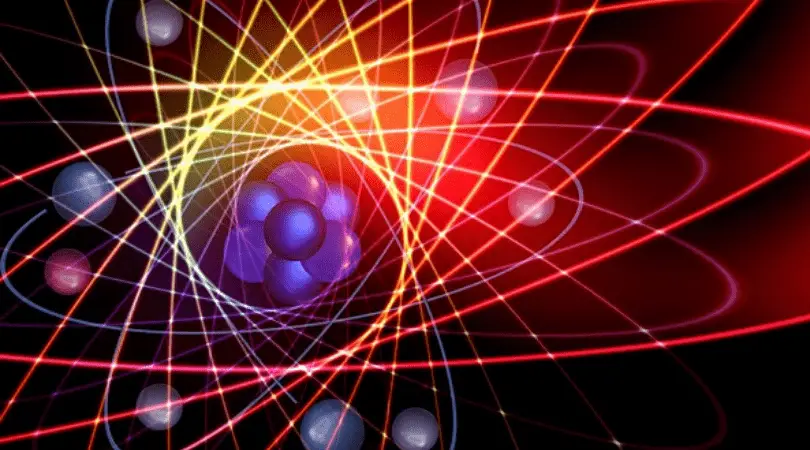
• Secure quantum communication protocols • Quantum-resistant cryptography • Quantum key distribution in real-world applications
• Quantum manifestations of classical chaos • Quantum chaos in black hole physics • Quantum scrambling and fast scrambling
• Quantum dots and artificial atoms • Quantum interference and coherence in mesoscopic systems • Mesoscopic transport and the quantum Hall effect
• Experimental tests of quantum gravity • Quantum gravity and cosmological observations • Quantum gravity and the early universe
• Spin-orbit coupling in condensed matter systems • Topological insulators and spintronics • Spin-orbit-coupled gases in ultracold atomic physics
• Quantum optomechanics and its applications • Cavity optomechanics in quantum information • Cooling and manipulation of mechanical resonators
• Precision measurements with entangled particles • Quantum-enhanced sensors for navigation and geodesy • Quantum metrology for gravitational wave detectors
• Quantum criticality and universality classes • Quantum phase transitions in ultra-cold atomic gases • Quantum Ising and XY models in condensed matter

• Topological qubits and fault-tolerant quantum computing • Implementing quantum gates in topological qubits • Topological quantum error correction codes
• Exotic phases of quantum matter • Supersolidity in ultra-cold gases • Applications in precision measurements
• Quantum cryptography for secure communication • Quantum repeaters and long-distance communication • Quantum key distribution in a practical setting
• Novel magnetic states and excitations • Fractionalized particles and any statistics • Quantum spin liquids in frustrated materials
• Topological edge states and protected transport • Topological insulators in condensed matter systems • Topological materials for quantum computing
• Quantum machine learning algorithms • Quantum-enhanced optimization for AI • Quantum computing for AI and data analysis
• Climate modeling and sustainability • Renewable energy sources and energy storage • Environmental monitoring and data analysis
• Sonic black holes and Hawking radiation in fluids • Aeroacoustics and noise reduction • Hydrodynamic instabilities and turbulence The field of physics is a treasure trove of exciting research opportunities that span from the universe’s fundamental building blocks to the development of cutting-edge technologies. These emerging research topics offer a glimpse into the future of physics and the potential to revolutionize our understanding of the cosmos and the technologies that shape our world. As researchers delve into these topics, they bring us one step closer to unlocking the mysteries of the universe.
- Astrophysics
- Electromagnetism
- Experiments
- GravitationalWaves
- ParticlePhysics
- QuantumMechanics
- thermodynamics
42 Digital Signal Processing Project Ideas to Explore
What is a research design importance and types, indian council of social science research calls for collaborative research project, email subscription.

iLovePhD is a research education website to know updated research-related information. It helps researchers to find top journals for publishing research articles and get an easy manual for research tools. The main aim of this website is to help Ph.D. scholars who are working in various domains to get more valuable ideas to carry out their research. Learn the current groundbreaking research activities around the world, love the process of getting a Ph.D.
WhatsApp Channel
Join iLovePhD WhatsApp Channel Now!
Contact us: [email protected]
Copyright © 2019-2024 - iLovePhD
- Artificial intelligence
Research Topics
Scientists and engineers at the Center for Astrophysics | Harvard & Smithsonian collaborate across a broad variety of scientific disciplines, from astronomy and astrophysics to related areas of physics and geophysics, in advancing humanity’s understanding of the universe. Learn more about the full spectrum of research covered at the CfA.
- Write my thesis
- Thesis writers
- Buy thesis papers
- Bachelor thesis
- Master's thesis
- Thesis editing services
- Thesis proofreading services
- Buy a thesis online
- Write my dissertation
- Dissertation proposal help
- Pay for dissertation
- Custom dissertation
- Dissertation help online
- Buy dissertation online
- Cheap dissertation
- Dissertation editing services
- Write my research paper
- Buy research paper online
- Pay for research paper
- Research paper help
- Order research paper
- Custom research paper
- Cheap research paper
- Research papers for sale
- Thesis subjects
- How It Works
100 Interesting Physics Topics For Research Paper In 2023

Searching for a topic in physics can be one of the more difficult challenges for students at any level. Teachers and professors want their students to research and write something original. They also want students to challenge themselves by pushing the envelope and studying new areas in the field. This can be overwhelming for students and trying to come up with even a handful of physics topics might seem an impossible task.
Choosing Physics Topics For a Project
A good physics research topic should be broad enough to let you find plenty of material to answer all of the important questions. It should, however, also be narrow enough to fit within the parameters of your assignment. We can help you with that. Check out our list of physics topics that cover a wide range of areas within the field:
Physics Research Paper Topics for High School
- How much are solar panels affected by dust?
- What is the discharge amount from a pinhole on a water bottle?
- Is time travel adequately explained in literature?
- Why do some carpets have more static buildup?
- How is light impacted when cast through a sugar solution?
More Topics in Physics High School
- What is the effect of light on degradable materials?
- How strong is the silk produced by a silkworm?
- Which truss design bridge supports the most weight?
- How much weight can nylon fishing lines maintain?
- How much weight can human hair maintain?
Five Cool Physics Topics to Do Quickly
- How strong is human hair of different thicknesses?
- Can eggs withstand more force from certain directions or angles?
- Can a metal pendulum accurately predict the sex of a chicken?
- What factors impact the heat capacity of different saltwater concentrations?
- How are projectile miniature rockets affected by temperature?
Physics Research Topics for College
- What are the mechanics of a perpetual clock?
- How does circular motion impact the rotation of various spheres?
- What are the components and nature of various atoms?
- How does weather affect gravity in falling objects?
- What role does physics play in the health care industry?
Physics Topics for Paper Graduate School
- What are the primary characteristics of the laws of motion?
- What are the major principles of Lorentz force law in relation to electromagnetism?
- How will quantum computing impact the physics of the 2020s?
- Will gravitational waves prove that Einstein’s theories are incorrect?
- How does rotational motion work when using different types of torque?
Special Topics in Calamity Physics
- How are calamity physics different from chaos theory?
- Do the concepts in Calamity Physics reflect reality?
- How do physic professionals view the opinions in Calamity Physics?
- Can Calamity Physics become a legitimate area of study?
- Where did the author of Calamity Physics get her ideas from?
Physics IA Topics Ideas for Studying
- What effect does temperature have on the speed of sound in a solid?
- What impact does sugar have on water’s refractive index?
- How does temperature influence the flight pattern of an item when fired?
- In what ways does shade affect a solar panel’s power output?
- How does the shape of a football affect its flight pattern?
Interesting Physics Topics for All
- Are floating cities a reality in light of rising water levels?
- Why was the 2020 Christmas Star such a rare phenomenon?
- What impact will the development of superconductors have on physics?
- How will the study of exotic materials be affected by superconductors?
- Will new discoveries in physics lead to new green technologies?
AP Physics Topics for High School
- How does one measure motion utilizing position-time charts?
- How is a ball’s motion on its way down a mirror image of its upward motion?
- How does one measure motion utilizing velocity-time charts?
- What are the major principles of electrostatics?
- Howe do simple pendulums and mass-spring systems work?
SAT Physics Topics Ideas for Studying
- How do airplanes gather wing lift?
- How does one measure the molecular sizes of various gases?
- How do gravity and wind resistance affect the arc of a ball thrown in the air?
- What patterns can be observed in an experiment involving paper airplane flights?
- In what ways is an object in free fall affected by gravity acceleration?
Physics GRE Topics for Studying
- How do magnetic fields in free space react to outside forces?
- What are the major components of optics and wave phenomena?
- How is a balloon’s surface area affective by weather?
- How does sound travel in different environments?
- What is the audible range of a human being?
MCAT Physics Topics Ideas for Studying
- Understand the characteristics of average speed and velocity.
- Understand how dimensions (distance and time) work in the Universe.
- Explain what Newton’s first, second, and third laws state.
- What is the law of Gravitation and what does it mean for the Earth’s physics?
- How do weight and mass differ in the construction of buildings?
Five Fun Physics Topics to Do Quickly
- How does kinetic energy help athletes improve performance?
- How does caloric intake affect the energy humans generate?
- What is the most effective way of optimizing a bottle rocket?
- What is the difference between potential energy and kinetic energy?
- How does the length and tension of a guitar string effect sound output?
Theoretical Physics Topics for Undergraduates
- How can our understanding of physics help reduce global warming?
- Why is physics essential to our society and how has it evolved?
- What are the major principles of quantum mechanics?
- What is the relationship between energy consumption and nuclear physics?
- What are the major factors that affect the trajectory of a rocket going to space? Discover more space topics .
Interesting Modern Physics Topics
- Why has the concept of cold fusion been contended by researchers?
- Is cold fusion a legitimate physical science or is it speculative?
- How can physics play a role in minimizing the effects of global warming?
- Why have Nobel Prize-winning physicists been contradicted in recent years?
- How is nanotechnology related to modern physics?
Great Physics Topics for Presentation
- What are the major principles that make an atomic bomb acts?
- How have the ideas for space and time explorations changed in the last 50 years?
- What impact did Galileo have on the world view of physics?
- What role did atomic particles play in building our universe?
- Is the Hadron collider capable of starting a black hole?
Physics Regents Topics for Preparation
- How much energy is expended when you go from walking to running?
- What makes perpetual motion machines work?
- What are the factors that affect drag in canoes?
- What are the differences between conservative forces and potential energy?
- In what ways is the conservation of energy affected by temperature?
Great Physics Paper Topics for a Short Project
- What are the best ways to make a catapult with Popsicle sticks?
- How to make a rudimentary prism at home?
- What factors affect the rotational speed of a DC motor?
- What characteristics lay within the concept of pyramid power?
- How do sailboats convert wind power to move forward?
Good Physics Projects Topics for a Long Project
- How much energy do solar panels input and output?
- How much energy do solar panels lose over a day?
- How did Stephen Hawking impact contemporary physics?
- What is the difference between centripetal and centrifugal forces?
- What are the measurement problems within quantum probability?
Physics Essay Topics Related to Everyday Situations
- How does temperature affect different musical instruments?
- How do you build a lawn sprinkler using a milk carton?
- How do you minimize the risk of egg breakage in cartons?
- Can light affect the shape and size of Jell-O?
- What does Einstein’s theory of relativity state about our surroundings?
Physics is really hard. We understand this and have committed ourselves to assist students at all levels and dealing with all situations. Our experts have put together these physics topics to help students save some time. We can also help develop custom physics science topics to fit any assignment requirements.
Just give us a call, email us, or send us a message by chat. Our customer service team representatives are available to help with any physics project topics you need. An excellent custom thesis is not a problem for us. We’ll connect you with the most qualified experts and will lighten the burden of the most difficult assignments.
Leave a Reply Cancel reply
Ask a question from expert
List of Top 240 Physics Research Topics in 2022

Before writing a research paper one must follow a few crucial steps of searching, researching, experimenting, and jotting. One cannot write a research paper on physics without following these steps. But before all these steps one has to decide the research topic. As the research topic chosen is the soul of the research paper. But choosing a research paper topic is not easy.
But with us, you can make the journey of writing a research paper on physics easier.
Here we are, to solve the most difficult problem of selecting/choosing the topic for writing a research paper. The research topic should be selected concerning the most important factor which is the availability of resources on that very topic. If you select a topic for writing a research paper on it, then kindly check if appropriate sources on it are available in the market or not.
Second, the topic should be chosen out of interest, as writing a research paper, especially on physics is going to be exasperating and a prolonged process that will make you tired. But to maintain consistency and perseverance in the work you must choose the topic of your interest, that will boost your interest and motivate you to keep going.
Definition of Physics
Physics is an important branch of science concerned with the nature and properties of matter, including mechanics, light, heat, sound, electricity, magnetism, etc. physics further has various sub-branches like classical mechanics, thermodynamics, electromagnetism or photonics, relativistic mechanic, quantum mechanics, optics and acoustics, condensed matter physics, nuclear physics, etc.
Physics is a wide subject having inculcated various topics in it. Writing a research paper on any of the topics of physics would be really time taking and make you feel tired. As it requires a lot of research, experimentation, and practical knowledge.
So, we are going to suggest to you some topics which are particularly related to the sub-branches of physics, interesting, as well as the material on all these topics are available on the internet, so you can choose any of these and start researching and writing.
25 General Research Topics in Physics
- Nuclear physics and its scope.
- Kinematics.
- Electromagnetic force is the strongest force. Comment.
- Liquid pressure versus air pressure.
- Dark matter studies.
- How were the planets formed?
- About positrons.
- Auger yield per nuclear decay. What is it?
- Plasma nitrogen fixation.
- Solar fuels.
- Role of ultrashort pulses in the maintenance of large infrastructure .
- High energy and particle theory.
- Quantum gravity and field theory.
- Strong interactions and field theory.
- Mesoscopic physics.
- Mass Moment of Inertia
- Angular momentum.
- Law of Conservation of Momentum
- Elasticity.
- The Electric Autonomous Vehicles.
- Electric vehicles.
- Sensors in vehicles.
- Analysis of Driverless Cars.
- Self-Driving Cars
- Investigation of Connected Cars
- Automotive Industry
- Concept of the continuum.
- Time dilation.
- Compare the thermodynamic debye model with the model of einstein.
- Describe the properties of fields with arbitrary spin.
- Describe the Feynman diagram.
- Theory of time travel.
- About exoplanets.
60 Latest and Innovative Research Topics in Physics
- Astrophysics, fusion, and plasma physics.
- Nanoscience and nanotechnology.
- Energy systems.
- Microfluidics and microsystems.
- Quantum information science.
- One-dimensional helium model.
- Shrinking of microchips.
- A four-stroke engine for atoms.
- What are electron whirlpools?
- Newly invented quantum flute.
- Making nanodiamonds out of bottle plastics.
- Entanglement of many atoms discovered.
- SU(N) matter is around 3 billion times cooler than deep space.
- The material emits pulses of super fluorescent light.
- Topological insulators.
- Molecular motors convert chemical energy into mechanical work.
- A quantum heat pump.
- Forces in jammed granular solids.
- Stable quantum batteries.
- Storing of energy into an electromagnetic field.
- Atoms’ clouds.
- Future of photovoltaic.
- What is the hall effect mystery?
- Relation between Neutron stars and gravitational waves.
- Superconducting diode.
- Multilayer graphene.
- Describe the 2D array of electrons and nuclear spin qubits.
- How does gravitational force impact the waves in water bodies?
- Transformative electronics.
- Artificial intelligence.
- How terrain evolves on icy comets.
- Binary star-planet system.
- Nasa’s Webb detects carbon dioxide in an exoplanet atmosphere. Write a descriptive note on the research.
- How giant meteorite impacts created the continent.
- Ripple's sheet protein structure.
- New fur for the quantum cat.
- New producing polymers.
- Foam stabilization.
- The formula for efficient hand sanitizers.
- What is hydrogel bioink?
- Tissue bioprinting.
- Classes of newly found semiconductors.
- Better metal-oxides.
- Greener energy.
- What is the MOXIE experiment?
- How are scientists producing oxygen on mars?
- Diamonds and rust at earth’s core-mantle boundary. Give the reason why.
- Using AI to train robots.
- About neuromorphic chip.
- Development of quantum computers.
- Bioengineering in the field of agriculture.
- Fossil crocs.
- X-shaped radio galaxies.
- Volcano catastrophe.
- Universe’s oldest fermions in the realm of quantum.
- Newly founded and added elements in the periodic table.
- Dark matter and dark energy.
- Hydroelectricity or electricity by nuclear energy.
- Wireless electricity.
Best Research Topics Related to the Sub-branches of Physics
The below listed are the sub-branches of physics.
- Modern Physics
- Thermodynamics
- Electricity
- Electronics
- Chemical Physics
- Astrophysics
- Nuclear Physics
- Considered Matter Physics
Definition of Mechanics and Research Topics Related to it
Mechanics is the branch of science and mathematics that deals with the study of motion and the forces that produce motion and result in displacement.
Top 10 Mechanics Research Topics
- Dynamics and Control.
- Production engineering.
- Aerodynamics and fluid control.
- Fluid mechanics.
- Vibrations, acoustics, and fluid-structure interaction.
- High-speed transportation systems.
- Aerial vehicles.
- Mechatronics.
- Aero-engine compressor blades.
Three Types of Mechanics
- Statistical
Definition of Classical Physics and Research Topics for it
Classical physics is the physics in which, from the physical ideas the newer ideas are predated. It basically encompasses all the theories that are drawn before the 20th century. Energy and the theory of matter are regarded as independent concepts throughout classical physics.
Top 10 Research Topics on Classical Physics
- Describe the newton law of motion.
- Why do ships not sink in water bodies?
- What are equipartitions explain with examples?
- Bernoulli’s principle.
- What causes surface tension?
- What do you mean by viscosity how does it vary from liquid to liquid?
- What is momentum?
- Explain oscillation.
Definition of Quantum Physics and Research Topics for it
Quantum physics or quantum mechanics is basically a theory in physics that provides a description of all the physical properties at the scale of atoms and sub-atomic particles.
Top 10 Quantum Physics Research Topics
- Schrodinger equation.
- Quantum field theory.
- Dirac equation.
- Quantum mechanics.
- Perturbation theory.
- Density matrices.
- Harmonic oscillator.
- Bracket notations.
Definition of Modern Physics and Research Topics for it
Modern physics is that branch of physics that deals with the theories which came into being after the 20th century. these theories are quantum mechanics, special relativity, general relativity, etc.
Top 10 Modern Physics Research topics
- Explain the theory of relativity.
- What was the ultraviolet catastrophe?
- Photoelectric effect.
- Classical lightwave model. Elaborate.
- Describe the working of the night vision device.
- Describe the production and uses of X-rays.
- Why the charge of an electron is quantized?
- State the relation between the kinetic energy of an electron relate to the light’s frequency and intensity.
- How will you identify the element by its line spectra?
- What is radioactive decay?
Definition of Thermodynamics and Research Topics for it
Thermodynamics is that branch of physics that deals with heat, work, and temperature, and their relation to energy, entropy, and the physical properties of matter and radiation. Basically, thermodynamics deals with the transfer of energy from one form to another form, and from one place to another.
Top 10 Thermodynamics Research Topics
- What are energy and its types?
- Explain and expand the quote, “energy can neither be created nor be destroyed”.
- Mention three types of thermodynamics processes.
- Uses of the kinetic energy.
- State some objects possess both kinetic and potential energy.
- A.C and D.C current.
- Working of electric motor.
- Working of electricity generator.
- Working of solar cells.
- Uses of wind energy.
Definition of Electricity and Research Topics on it
Electricity is defined as the flow of electric charge. Electricity is both a part of nature and a secondary form of energy.
Top 10 Electricity Research Topics
- Coulomb’s law
- Voltage sources.
- Electric potential difference.
- Combinations of capacitors.
- Ohm’s law
- Electric circuit fundamentals.
- Circuit analysis.
- Magnetic effect of current
- Combining resistors.
- Electric field and the movement of charge.
Definition of Magnetism and Research Topics on it
Magnetism is a type of force that is produced by moving electric charges. Magnetism creates two forces, force of attraction and force of repulsion.
Top 10 Research Topics for Magnetism
- Diamagnetism.
- Paramagnetism.
- Ferromagnetism.
- Antiferromagnetism.
- Superparamagnetism.
- Role of magnetic in speakers.
- The magnetic field of steady currents.
- Magnetic forces.
- Lorentz force.
Definition of Geophysics and Research Topics for it
Geophysics is a branch of natural science that deals with the physical properties and natural phenomena of the earth.
Top 10 Research Topics on Geophysics
- Electromagnetic waves.
- Radioactivity.
- Mineral physics.
- Fluid dynamics.
- Gravitational forces.
- Atmospheric science.
- Geomagnetism.
- Seismology.
Definition of Optics and Research Topics for it
Optics is the branch of physics that deals with the behavior and properties of light. Along with its interaction with matter and the instruments used to detect it.
Top 10 Research Topics Related to Optics
- Three branches of optics in physics.
- Geometrical optics
- Quantum optics.
- Physical optics.
- Ultra-violet rays
- Infrared rays.
- What is the ray of light?
- What is a light wave?
- State the difference between ray and wave.
- Refraction and reflection of light, are elaborate.
Definition of Electronics and Researh Topics Related to it
Electronics is a branch of science to be precise electrical engineering that deals with the emission, behavior, and effects of electrons using electronic devices.
Top 10 Research Topics Related to Electronics
- Fiber optic communication.
- Nanoelectronics.
- Zigbee technology.
- Human area network.
- Embedded systems.
- Organic light emitting diode.
Definition of Chemical Physics and Topics Related to it
Chemical physics is the amalgam of both chemistry and physics and the branch of science. It investigates physicochemical phenomena and studies chemical processes from the point of view of physics.

Top 10 Research Topics on Chemical Physics
- Computational chemical physics.
- Electrochemical energy materials, description, and their uses.
- Atomic and molecular formula.
- Chemical energy.
- Conversion of chemical energies.
- Fusion plasma physics.
- Condensed matter physics.
- Spectroscopy.
Definition of Biophysics and Research Topics on it
Biophysics is a course in science that applies approaches and methods traditionally used in physics to study biological phenomena. Biophysics covers all the scales of biological organization, from molecular to organismic and populations.
Top 10 Research Topics on Biophysics
- Structure of protein.
- Dynamics of molecules.
- Neurodegenerative diseases.
- Protein folding and self-assembling.
- Ultrafast laser spectroscopy.
- System biology and bio-networks.
- Force transduction in muscle.
- Proteomics and genomics.
- Membrane biophysics.
- System neuroscience.
Definition of Astrophysics and Research Topics on it
Astronomy is the branch of science that is concerned with the physical nature of stars and other celestial bodies in the universe. Astrophysics is a science that uses the methods and principles of physics and chemistry in the study of astronomical objects and phenomena.
Top 10 Research Topics on Astrophysics
- Stellar dynamics.
- Structure of galaxies.
- Astrophysical fluid dynamics.
- Cosmology and its theories.
- Theory of relativity.
- Statistical physics.
- Evolution of stars.
- Evolution of galaxies.
- Planetary motion.
- The secret behind black holes.
Definition of Nuclear Physics and Research Topics Related to it
Nuclear physics is the branch of physics that deals with the study of building blocks and interactions of atomic nuclei.
Top 10 Research Topics for Nuclear Physics
- State the general properties of the nucleus.
- Nuclear reactions.
- Nuclear fusion.
- Nuclear fission.
- Use of nuclear energy in making electricity.
- Nuclear weapons.
- Practical applications of nuclear phenomena.
- What are nucleons and glucons?
- Radioactive isotopes.
Definition of Condensed Matter Physics and Research Topics for it
Condensed matter physics is the branch of science in the field of physics that deals with both the microscopic and macroscopic physical properties of matter.
Top 10 Research Topics for Condensed Matter Physics
- Superfluid.
- Bose-einstein condensate.
- Liquid crystals.
- Complex fluids.
- Adhesion and lubrication.
- High-temperature superconductivity.
- Strong correlations.
- Semiconductor transistors.
- Laser technology.
- Importance of condensed matter physics.
These were some research topics on physics that we feel has helped you. A brief description of every branch of physics was done to make you aware of a bit of the complex words in science. So that your research could become easier and less difficult. Now that you are aware of every sub-branch, you should better start researching, experimenting, and jotting down the findings. Now you are all set to present a research paper on the table.
Get more about research and research topics down here -
- 130+ Marketing Research Topics for Marketing Students
- Top Trending 150+ Accounting Research Topics
- Top 140+ Research Topics for Journalism Students
- 120 Hot Research Topics for Nursing Students
- Top 50+ Research Topics for High School Students in 2022
- A Thorough Analysis of Market Research
- Research for Psychology and Personality Disorder
- Mental Health Research Topics for Students in 2022
- 4 Tips on How to Find Homework Answers Quickly
- How to Write Different Types of Research Paper ?
- How to Choose a Research Topic ?
- Step-by-step Guide For How to Write a Dissertation ?
- Scope of Career in Research and Development
- Organization study on HDFC bank
- Is Desklib Free?

Business Management
Writing & Compare Documents
Computer Science
Teaching and Learning
Personal Development
Research Topics
Recruitment
NVQ Level 3 Diploma in health & social care
Digital Marketing
Assignment Writing
International
Speech Topics
Travel And Lifestyle
Project Proposals
Your Feedback matters
Secondary Menu
Research topics.
The broad focus of Prof. Baranger's group is quantum open systems at the nanoscale , particularly the generation of correlation between particles in such systems. Fundamental interest in nanophysics-- the physics of small, nanometer scale, bits of solid-- stems from the ability to control and probe systems on length scales larger than atoms but small enough that the averaging inherent in bulk properties has not yet occurred. Using this ability, entirely unanticipated phenomena can be uncovered on the one hand, and the microscopic basis of bulk phenomena can be probed on the other. Additional interest comes from the many links between nanophysics and nanotechnology. Within this thematic area, our work ranges from projects trying to nail down realistic behavior in well-characterized systems, to more speculative projects reaching beyond regimes investigated experimentally to date.
Correlations between particles are a central issue in many areas of condensed matter physics, from emergent many-body phenomena in complex materials, to strong matter-light interactions in quantum information contexts, to transport properties of single molecules. Such correlations, for either electrons or bosons (photons, plasmons, phonons,…), underlie key phenomena in nanostructures. Using the exquisite control of nanostructures now possible, experimentalists will be able to engineer correlations in nanosystems in the near future. Of particular interest are cases in which one can tune the competition between different types of correlation, or in which correlation can be tunably enhanced or suppressed by other effects (such as confinement or interference), potentially causing a quantum phase transition-- a sudden, qualitative change in the correlations in the system.
My recent work has addressed correlations in both electronic systems (quantum wires and dots) and photonic systems (photon waveguides). We have focused on 3 different systems: (1) qubits coupled to a photonic waveguide, (2) quantum dots in a dissipative environment, and (3) low-density electron gas in a quantum wire. The methods used are both analytical and numerical, and are closely linked to experiments.
Research Topics description from ~2008:
The broad focus of Prof. Baranger's group is the interplay of electron-electron interactions and quantum interference at the nanoscale . Fundamental interest in nanophysics - the physics of small, nanometer scale, bits of solid - stems from the ability to control and probe systems on length scales larger than atoms but small enough that the averaging inherent in bulk properties has not yet occurred. Using this ability, entirely unanticipated phenomena can be uncovered on the one hand, and the microscopic basis of bulk phenomena can be probed on the other. Additional interest comes from the many links between nanophysics and nanotechnology. Within this thematic area, our work ranges from projects trying to nail down realistic behavior in well-characterized systems, to more speculative projects reaching beyond regimes investigated experimentally to date. Currently, 5 topics are being actively pursued: 1. Kondo Effect in Nanoscale Systems The Kondo effect is a classic of many-body physics involving the correlation of an electron in an isolated level with a bulk Fermi sea. In contrast, we consider a finite size Fermi sea and so treat the non-zero level-spacing in the lead. The relevant experimental situation is two quantum dots connected by tunneling, a very small one to supply the electron in an isolated level and a large one to act as a nanoscale Fermi sea. [with R. Kaul, D. Ullmo, and Prof. S. Chandrasekharan] 2. Molecular Electronics We have established a state-of-the-art program to calculate the electric current through single molecules. This involved substantial program development in previous years; we are now concentrating on studying various systems. For instance, we carried out an extensive study of molecules containing cobaltocene , a sandwich molecule consisting of a Co atom between two 5-member carbon rings. Cobaltocene has spin 1/2, and manipulation of this spin strongly affects the electrical conduction. Thus we have introduced the first examples of true molecular spintronics - a spin filter, spin valve, and spin switch. [with R. Liu, S.-H. Ke, and Prof. W. Yang] 3. Quantum Computing: Decoherence in Quantum Error Correction We focus on the effects of decoherence - processes which break the quantum mechanical coherence at the basis of this type of computation. A key question is how decoherence scales as the computer becomes larger, that is, as the number of qubits increases so that the states of the computer become increasingly more complicated entangled states. Initial pessimistic estimates were circumvented by quantum error correction , a clever encoding of a single logical qubit using several physical qubits. We are studying how decoherence due to correlated noise scales in a computer using error correction. [with E. Novais and Prof. E. Mucciolo] 4. Toward Strong Interactions in Circular Quantum Dots The “electron gas” model of electrons in solids – in which the conduction electrons interact via Coulomb forces but the ionic potential is neglected – has been a key paradigm of solid state physics. Quantum mechanically, the physical properties change dramatically depending on the balance between the strength of the Coulomb interaction and the kinetic energy. The limiting cases are well understood: for very weak interactions the particles are delocalized while for very strong interactions they localize in a Wigner crystal. The physics at intermediate densities is surprisingly rich and remains at the forefront of research. We are studying the intermediate density electron gas confined to various nanostructures by using quantum Monte Carlo techniques. [with A. Ghosal, D. Guclu, and Prof. C. Umrigar] 5. Quantum Phase Transitions We are studying models of strongly interacting systems in which there is a quantum (zero temperature) phase transition as a function of disorder strength. The models are chosen so that there is a cooperative many-body ground state (superconductivity or ferromagnetism), and the disorder introduces inhomogeneity through quantum interference. As the inhomogeneity in the system grows, the cooperative state is eventually killed at a quantum phase transition. Through careful study using recently developed algorithms, we identify a bosonic superconductor-insulator transition which has new critical exponents which sharply disagree with previous theoretical prejudices. [with A. Priyadarshee and Prof. S. Chandrasekharan]
- Administrative Website
- Our Facilities
- Advanced Light Imaging and Spectroscopy (ALIS) facility
- Instrument Shop
- Instructional Machine Shop
- Duke Teaching Observatory
- Directions & Maps
- 1924 to 1945
- 1946 to 1962
- 1963 to 1985
- 1986 to 2005
- Faculty Interviews
- Lawrence C. Biedenharn
- Edward G. Bilpuch
- William M. Fairbank
- Walter Gordy
- Harold W. Lewis
- Fritz London
- Henry W. Newson
- Walter M. Nielsen
- Lothar W. Nordheim
- Hertha Sponer
- William D. Walker
- Department Chairs
- Former and Current Faculty
- Statement on Conduct
- Conduct Accountability Committee
- Department Resources
- Leadership & Department Contacts
- Fritz London Memorial Prize
- Fritz London Memorial Lecture
- Learning About Physics
- Learning About Biophysics
- Credit for College Board Advanced Placement (AP)
- B.S. Degree Requirements
- B.A. Degree Requirements
- Physics Minor Requirements
- Concentration in Astrophysics
- Biophysics Faculty
- Introductory Physics Course
- Intro Course Placement
- Sample Course Schedules
- Faculty Research Advisors
- Independent Study
- Undergraduate Research Fellowships
- Fellowships for Majors
- Study Abroad
- Graduation With Distinction
- Daphne Chang Memorial Award
- Tutoring & Course Help
- Transfer Credit FAQ
- Ph.D. Requirements
- Admissions Process
- Past Fellowship Recipients
- Living in Durham
- Campus Visits & Open House
- Graduate Placements
- New Student Orientation
- Assessment Exams
- Academic Integrity Policy
- Criteria For Good Standing
- Standards of Conduct
- Research Talks
- Preliminary Examination
- Dissertation
- Mini Courses
- Conference Travel
- Steps to Graduation
- GSO Meeting Minutes
- GSO Updates
- All Courses
- Non-Physics Majors
- Introductory Undergraduate
- Undergraduate Core
- Undergraduate Electives
- Graduate Core
- Graduate Electives
- Astrophysics
- Atomic, Molecular & Optics
- Condensed Matter
- Nuclear/Particle
- Primary and Joint Faculty
- Secondary Faculty
- Research, Teaching or Adjunct Faculty
- Emeritus Faculty
- Researchers
- Graduate Students
- Atomic/Molecular/Optical (AMO) Physics
- Biological Physics
- Condensed Matter & Materials Physics
- Cosmology & Astrophysics
- Experimental Nuclear Physics
- Mathematical Physics
- High Energy Physics
- Imaging & Medical Physics
- Nonlinear & Complex Systems
- Quantum Information Science
- Theoretical Nuclear & Particle Physics
- Research Labs
- BQ1: What are the ultimate laws of nature?
- BQ2: What principles govern strongly interacting matter?
- BQ3: How does quantum physics explain and predict novel materials?
- BQ4: How can we understand complex soft matter and biological systems?
- BQ5: How can physics research improve the practice of medicine?
- BQ6: How does physics drive the information and computing revolutions?
- BQ7: How can we use physics to benefit society?
- Publications
- Alumni Profiles
- Assisting Duke Students
- For Current Students

Physics Research Topics
Physics is a fundamental division of science that deals with aspects of daily life. Even nowadays we can’t imagine our life without physics. Due to the increasing demands of dream life scope of physics vesting day by day. If you are searching the ideas about different aspects of physics regarding your research.
This article helps you find great ideas for your bachelor, master, and MPhil-level research. It is an enormous academic field with considering many divisions and aspects.
For students of any level, finding interesting physics topics for the project might be one of the more challenging tasks. This can be daunting for students, and coming up with even a few physics research topics may seem impossible. Physics thesis topics should be wide enough to provide you with a wealth of information to address all key issues. But it should also be constrained by the requirements of your assignment. We can assist you in providing simple physics research topics . Check out our list of physics research topics for undergraduates , which includes subjects from several subfields.
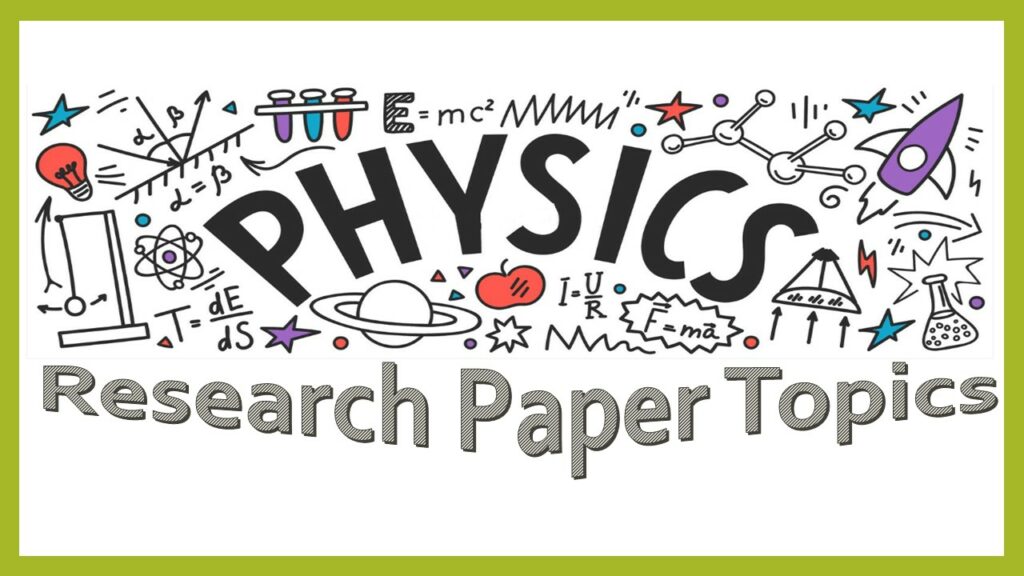
Thermodynamic Physics
- Study of thermodynamically as a kinetic theory of matter physics
- Investigation of the motion of perpetual
- Analysis of different objects with the help of entropy
- Exploration of process of the thermodynamic process with the help of types of thermodynamic
- The mathematical study of the Carnot cycle with the investigation of entropy
- Theoretical comparison of different engines’ efficiency with Carnot engine efficiency
- Finding a new way of renewable chemical fuels with the help of semiconductors
- Study of convention and diffusion process with the help of carbon dioxide
- How to improve the extraction of critical minerals
- Investigation of the different features of enthalpy and how it is change
- Study of solid-state electrolyte based on photopolymerization by using sodium batteries
- Study of solid-state electrolytes based on photopolymerization by using neon batteries
- Finding tube heat exchangers with the help of experimental study
- Exploration of the characterization of electrolytes batteries
- The modern concept of thermodynamics with the help of theoretical study
- Explore the features of using catalysts in electrolytes batteries
- Comparison of sodium-based batteries and lithium-based batteries with help of theoretical study
- Comparison of sodium-based batteries and lithium-based batteries with help of experimental study
- Study of Zeroth law at high temperatures with specific conditions
- Exploration of the methods of getting process in which we get renewable energy from different materials
Plasma Physics
- Investigation of the conversion of charged particles into plasma physics
- A quad limitation plasma source with cloud shows a suggestion of a free-space ion acceleration layer
- Plasma physics models of Sarkas for electron transpiration cooling in hypersonic vehicles
- How to use Laser-induced fluorescence spectroscopy to measure the parameters of the plasma both inside and outside of a plasma cathode based on a microwave discharge tube
- Explore the possibilities of generating spacecraft electricity from the planetary solar system
- Models of hypersonic vehicles’ based on plasma sheets of electron transpiration cooling
- Why particles are in the near-Earth space is charged
- Spontaneous magnetic fluctuations and collisions-free turbulence regulation in earth’s magneto tail with wave plasma study
- Time resolving of Imaging of a nitrogen micro jet’s femtosecond Laser-Induced plasma expansion
- Plasma absorption of laser energy with mode conversion in the presence of an inhomogeneous external magnetic field
- Shock waves in electron-positron-ion plasma and the heat flux effect of model-driven solitary by using the Ion temperature gradient method
- Space-charge effects with two-frequency fields accompany and two-surface multifactor discharge
- Acoustic solutions from dust ions and double layers in a dusty plasma with Cairns-distributed electrons and adiabatic positive ion species
- Innovative investigative technique for space-resolved spectroscopy of ECR plasma with X-ray Imaging
- Sea ice detection using CFOSAT/SWIM scatter meter near-nadir Kuban echoes
- Self-generated plasma rotation in a Z-pinch implosion with a pre-embedded axial magnetic field of moist convection across the gray zone in response to the surface flux field’s spectral feature at model resolution.
- Nonlinear ion acoustic shock wave excitation in unmagnified relativistic plasma is affected by a space fractional parameter
- Study of how plasma and an electromagnetic field interact in a 12cm ECR ion thruster’s ion source
- Exploration of nanosecond pulsed dielectric barrier with plasma actuator of a water film on the surface
- Kinetic simulations of strongly magnetized parallel shocks by using the moist convection method
Nuclear Physics and Subatomic Particles
- Investigation of COMPASS experiment’s examination of the nucleon’s spintronic structure
- Study of the hadronization process and how the quark spins
- Hadron Physical science Undertakings of the EIC bunch at the EIC collider in different countries
- How to work High Energy Gamma Ray Astrophysics group’s projects
- Exploration of optima chemical force sensors by using in an experimental search for Dark Matter
- In elevation exactitude physics with interesting atoms precision calculation of the muon’s magnetic variance
- Experimental study of small distance relations by means of a double-membrane optic mechanical sensor
- Analysis of the conversion of muons to electron
- Investigate the process of radioisotopes decay in a short time while others require trillions of years
- Investigate the methods of safe nuclear energy
- What features have we used theoretically to make nuclear weapons safe?
- How we used heavy elements as a use full source of energy
- Find the method to explore radioactive dating with modern process
- Investigation of the historic match of nuclear stars and neutron stars with the help of statistical tools
- Explore the procedure advantages of the world’s largest fusion experiment ITER
- Analysis of the measurement of the theory of strong force
- Relationship study between the spin polarizabilities of proton measuring and strong force
- Thoroughly study of disadvantages of the detection of tumors by using Radiotherapy
- Experimental study of major issues of nuclear energy
- How to overcome the problems we faced during nuclear fusion theoretical suggestions
Condense Matter Physics
- Analysis of pressures close to those of the air, biomimetic materials
- The modeling of synchrotron-based UV utilizing Resonance Raman and Neutron Scattering experimentations together to hydrate biomolecules
- An experimental study with superconducting currents, embossing multimode optical connections in extremely short-lived light pulsations
- Study of new quantum materials’ electronic and spin properties for spintronic applications in the future
- Analysis with the Fermi experiments study in the liquid phase
- Experimental study of transport phenomena at the Nanoscale in silicon-based materials
- Explore the characterization of Simulations using quantum Monte Carlo for magnets with a lot of frustration
- Characterization Simulations using quantum Monte Carlo for unconventional superconductors
- Investigate how Nickelate’s devices are controlled by THz
- Theoretical aspects of time-Resolved Spectroscopy Investigation with the Ultrafast Dynamics of Complex Materials
- X-ray scattering in both near-field phytography and full-field imaging with experimental study
- Investigation of Dark-field tomography with X-rays
- How ultra-short light pulses for the drive of observing matter’s unidentified properties
- Spintronic and quantum computing investigation with new quantum material and electronic structure simulations
- Thoroughly study Ytterbium atoms in programmable optical micro traps that are extremely cold
- Quantum simulations are governed by a single atom of highly correlated states of matter
- Atomic-scale electronic and structural characterization of nanostructured surfaces with nuclear study
- Manipulating the light angular momentum wave-mixing from the visible to the EUV regime for ultrafast control of matter’s quantum phases
- Investigation of catalysts in the sub-nanometer range to deal with the lack of valuable raw materials
- Analysis of structural and electronic characterization of a combination of antiperovskite materials
Electronic Physics
- Plan and development of a 0-24v variable-directed power supply
- The impact of refused disposal on Nigeria’s human health
- Design and construction of traffic light
- Design and construction of the battery level indicator circuit proximity and distance sensor
- Design and construction design and construction of a 12 v car battery charger circuit with a USB phone charging port
- How to repair a damaged air conditioner
- Development of a light-sensitive alarm system step-up transformer construction with multiple outputs 12the making of the 13th electronic display board
- Create a piece of equipment that can make it simple and convenient to control our domestic appliances
- The construction and design of an uninterruptible power supply
- Using a seven-segment display a clever 250-volt battery charger with a microprocessor was designed and built factors contributing to Nigeria’s power
- The lighting switching control system’s (interface) design and implementation
- A natural convection solar dryer that requires little, if at all, maintenance
- The growth of civilization 20 can be attributed to the availability or accessibility of suitable materials
- A better methodology for determining horizontal good productivity at a stable state
- An Ac/solar rechargeable lantern 22’s design and construction development of a gsm-based home mechanization
- The 20watts wireless public address system
- Design and construction 25-inch arc welding machine of the inverter type is designed
- Automation of the home control switch with GSM communication
- Based on t junction traffic light controller 27, the construction of a microcontroller
- The 60 watts power amplifier 28’s design and construction averter design
Astrophysics
- Explore the study of cosmological large-scale structure’s primordial features and relativistic effects from their astrophysical foregrounds
- Using modified gravity theories to calculate how dark matter halos will cluster composed
- Investigation of galaxy clusters’ substructure and impact on the environment
- Study of neutron-capture elements in galactic archaeology
- The Chemical Advancement of the Milky Way in the Period of Large Galactic Studies: Merging Neutron Stars and Related Phenomena
- Analysis of the basic theory of radio to gamma rays, the observed sky contains large-scale features
- Explore the features of gamma Rays in form of the Quiet Sun
- Fundamental features study of climate exploration of the Habitable Zone using multiple parameters
- Theoretical study of connecting cosmic and planetary tenability
- Experimental measurements of the rate of mass accretion in galaxies’ clusters
- The fundamental role that stars and dust play in the baryon cycle of the universe
- Analysis of galaxy regression as a result of a shifting initial mass function
- Characterizing the Proto-Cluster population through cosmological simulations, probing the deionization epoch with quasar absorption lines
- Exploring the elements of light that come from beryllium and lithium
- The chemistry and dynamics study of the Milky Way’s stellar fossils to learn more about how galaxies form
- Analyze the stellar spectra to determine chemical abundances
- Investigation of the study of physics in space between galaxies
- Theoretical behavior of machine learning methods in cosmology
- High-Performance Computing in Cosmology renovating vast designs at various scales
- Exemplifying the missing baryonic mass at cosmic noon for a joint in laboratory astrophysics held by Electra
Nanoparticle Physics
- Investigation of the theory of quantum mechanics for collisions of different molecules and atoms in a magnetic field
- Explore the fundamental issue of cold molecules based on spin depolarization
- Study of electron-impact excitation using an R-matrix and pseudo-states for diagnostic purposes
- A brief study of Optics, atomic and molecular science’s long-term investment
- The analysis of molecular alignment over two pulses
- Theoretical study of physics at the nanosecond level
- Investigation of introduction to quantum electrodynamics such as photons and atoms
- Advances in the study of Optical, Atomic, and Molecular Physics
- The brief explores Blanchard’s recurrence relations and generalized hyper viral relations for radial matrix elements
- Analysis of the strong-field dissociation of N2 molecules, excited neutral atomic fragments
- Study of fiber Bragg gratings and their applications as temperature and humidity sensors
- Estimation of the accuracy of pure XH group II atom isotopes
- Study of vibrational transition frequencies including toward the test of the MP/me variance
- Using a molecule’s electrons investigation of self-imagine is known as strong-field scattering physics.
- Exploration of hydro genic-donor states confined by B-splines and spherical quantum dots
- High-order harmonic generation from a single atom or molecule results in formation with velocity and acceleration on the dipole
- Photograph twofold Ionization of He at 100 eV to 450 eV above the edge
- A closed atomic transition using polarization spectroscopy applications that locking of laser frequencies
- Analysis of the Physics of high-intensity lasers and atoms
- Suggestion from experimentations that multiphoton double ionization causes electron repulsion
Quantum Physics Research Paper Topics
- The investigation of mapping of the Bethe surface during ion-atom collisions with a single ionization
- Exploration of pronounced acceleration of the hydrogen atom
- Analysis of electron effect double ionization of helium at midway impact energy, the second-order, two-step appliance overcomes
- The advancements feature of in optical, atomic, and molecular physics
- Investigation of atomic physics measurement of the correlation between electrons
- Analysis of the statistical method for averaging the matter wave’s refractive index
- Experimental behavior of Berry’s time: topological concepts from optics, atomic, and molecular physics.
- From the atom to the meniscal analysis of the significance of quantum coherence in various complex systems
- Study of the asymptotic iteration method that is used to solve the potential family’s radial Schrödinger equation
- Quantum channel distances calculation as follows the application of the Fano representation
- Exploration of Exact survival probability results from the multistate Landau-Zener model.”
- Conical intersections study of molecular optical lattices caused by a laser
- Binding and multiple optical trapping: new ways to build oneself
- The perilous comparison of C6++ He fully differential ionization cross sections between theory and experiment study
- Investigation of noisy environments and remote state preparation through a GHZ-class state
- The fundamental study of Laser-assisted photoionization and molecular tomography use coulomb–laser coupling.
- Investigate the effects after the collision in the multiple ionization of neon by protons
- By using atomic, molecular, and optical precision measurements to find new physics
- The atom-wall interaction road map for ultrafast x-ray atomic and molecular physics
- Investigation of an innovative approach to the correlation polarization potential-elastic scattering of electrons with low energy produced by He atoms
Optical Physics Research Topics
- How to investigate the atomic europium anion through experiments
- Experimental evidence of fundamentals of quantum regulation of molecular processes
- Atomic hydrogen study in slow beams through multiple stages of Zeeman deceleration
- The study of advancements in optical, atomic, and molecular physics
- The entanglement of two Jayne’s–Cummings atoms’ sudden demise
- Exploration of Advances in Atomic, Molecular, and Optical Physics
- Theoretical investigation of cavity Quantum Electrodynamics
- The atomic dynamics bound in the MeV range
- For quick heavy ion-atom collisions, triply difference particular ionization of a cross segments in coplanar and non-coplanar geometry are essential
- Advances study of the behavior of elements in Optical, Atomic, and Molecular Physics
- The preservation of predicament and population capture Atomic physics: an investigation of issues and their solutions.
- The fundamental study of the interaction between optical resonators and atomic ensembles: Traditional description
- Low-energy, high-resolution helium positron scattering measurements of the total cross-section of scattering
- An arbitrary state can be efficiently shared by symmetric multiparty quantum states
- Study of helium electron-impact total single ionization benchmark cross-sections
- The doubly excited resonance states and ground states are embedded in dense quantum plasmas
- A varaitional approach to the cold atom association nonlinear Landau–Zener problem
- Study of ion implantation results in single photon emission from Si V centers in diamond
- Calculations of helium isoelectronic bound states that are uncoupled and correlated
- Exploration of atomic argon X-Rayed multiple times by extreme UV unrestricted electron laser pulsations at 60 nm indication of an electron band sequence
Atomic and Molecular Physics
- One-dimensional absorption spectroscopy with cold gasses in galaxies
- Two and three dimensions absorption spectroscopy with cold gasses in galaxies
- Study of collapse models with the help of density functional theory
- Magnetic properties of antiperovskite materials by using density functional theory
- Exploration of the electronic and spin material goods of specified quantum constituents for upcoming
- Experimental study of the applications of Spintronic
- Structural and electronic characterization of perovskite material by using experimental
- Spintronic and magnetization properties of aldehydes with the help of theoretical physics
- Investigation of structural and electronic properties including band gap of combinations of alkali metals by using Wien2k software
- Study of atoms and ions in engineering open systems and quantum simulations
- Analysis of atomic cooling by one photon using an optical Maxwell demon valve
- For single-atom ionization in the tunneling regime, resonant structures in the low-energy electron continuum are needed
- Investigation of optical cycling’s radiation pressure force on a polyatomic molecule
- Scattering between electrons, molecules, and atoms is influenced by rotational rainbow effects
- Hypothetical investigation of distinct attosecond beat age with a three level laser field
- Exploration of binary condensates in axisymmetric traps’ ground state geometry
- Theoretical investigation of double ionization of helium by proton impact, electron-electron links and dipole selection rules apply
- The theoretical approach of Kohn-Sham potentials for atomic multiples in the early universe’s atomic and molecular processes
- Optical frequency/wavelength references for the experimental determination of the differential cross-section surface for elastic electron–atom (molecule) scattering
Physics is very challenging. Our specialists have compiled these theoretical physics topics to save students some time. You may produce an exciting physics research paper using the list of the above-given physics research topics ideas provided in this blog post. So, feel free to browse the list of potential latest research topics in physics above and choose one that relates to your interests. Last but not least, students should ensure that their themes are neither too limited nor too broad, regardless of whether they choose to write about physics IA or SAT physics education research topics.
What research can I do in physics?
Physics research can usually be classified as theory, experiment, computation, or somewhere between. Each type of research has its challenges and rewards.
Which branch of physics is the hardest?
Atomic Physics is considered one of the most complex branches of Physics
Which branch of physics is best for research?
Advanced Physics is an excellent option for those interested in a career in teaching or academia. Similarly, this is a superb concentration if you are interested in doing physics research and finding interesting physics topics for project.
What are the best theories in physics?
Perhaps the most revolutionary theories in the history of physics have been relativity theory and quantum mechanics.
About The Author
Related Posts
Corporate finance research topics.

Animal Biochemistry Research Topics
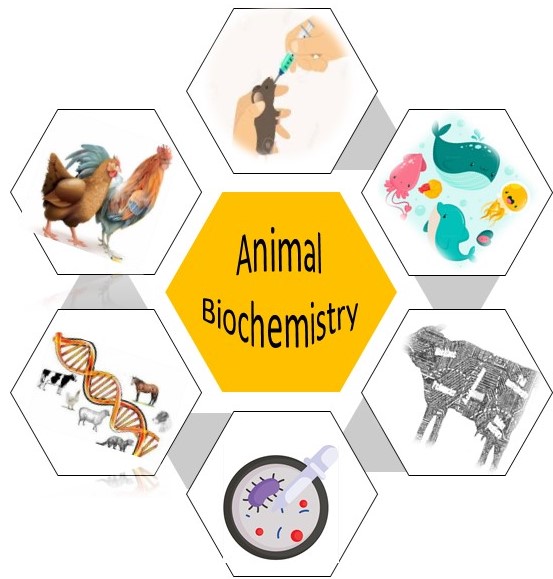
Plant Biochemistry Research Topics

Environmental Science Research Topics

Microeconomics Research Paper Topics
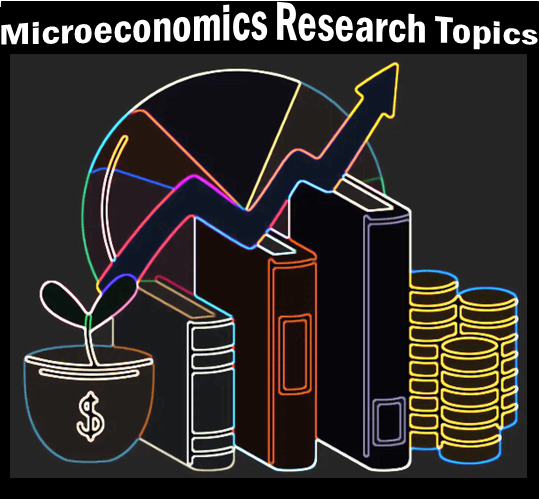
Marketing Research Paper Topics
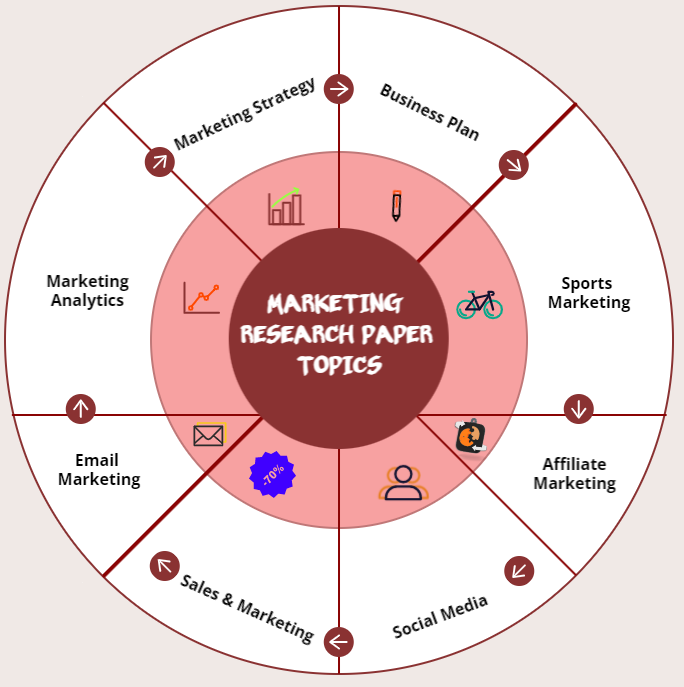
Leave a Comment Cancel Reply
Your email address will not be published. Required fields are marked *
Save my name, email, and website in this browser for the next time I comment.
A List of 240 Physics Topics & Questions to Research
Plates break when you drop them. Glasses help you see better. Have you ever wondered why?
Our specialists will write a custom essay specially for you!
Physics has the answer. It studies the observable as well as invisible aspects of nature. An essential part of this is examining the structure and interactions of matter.
Are you a high-schooler studying for your exams? Or maybe you need to write an interesting physics paper for your Ph.D. research or college seminar? This article presents a list of the most popular topics in physics for you to choose from.
Best of all, you don’t have to push yourself too hard to finish your essay. Custom-writing.org is happy to help students with all kinds of written assignments.
🔝 Top 10 Physics Research Topics
✅ branches of physics.
- ⭐ Top 10 Physics Topics
- ⚙️ Mechanics
- 🌡️ Thermodynamics
- ⚡ Electromagnetism
- 🔊 Sounds & Waves
- ☢️ Modern Physics
- 🔋 Physics Project Topics
- 🔭 Astrophysics
- 🌎 Physical Geography
- 🤔 Theoretical Physics
- ⚛️ Quantum Physics
🔍 References
- Modern vs. classical physics
- Gravity method in geophysics
- Why can’t the multiverse be real?
- Nuclear physics vs. quantum physics
- Photonics’ relationship to other fields
- Is electromagnetism the strongest force?
- What would extra dimensions look like?
- The importance of kinematics in real life
- Is string theory a generalization of quantum field theory?
- The difference between liquid pressure and air pressure
Now: before writing about physics you should know about its main branches. These are classical and modern . Let’s take a closer look:
- Mechanics , which is concerned with motion. Two of its essential aspects are kinematics and dynamics.
- Optics helps us understand the properties of light.
- Another branch investigates waves and sound . It studies the way they travel and how they are produced.
- Thermodynamics deals with heat and motion. One of its key concepts is entropy.
- Electromagnetism studies the interactions between charged particles. It also deals with the forces and fields that surround them.
- Finally, physical geographers observe our Earth’s physical features. These include environmental processes and patterns.
- Atomic physics , which examines the structure and behavior of atoms.
- Nuclear physics investigates the nucleus of atoms. This branch often deals with radioactivity.
- Scientists working in quantum physics concentrate on the erratic behavior of waves and particles.
- Relativity can be general and special. Special relativity deals with time and motion. General relativity describes gravity as an alteration of spacetime caused by massive objects.
- Cosmology and astrophysics explore the properties of celestial bodies. Cosmologists strive to comprehend the universe on a larger scale.
- Mesoscopic physics covers the scale between macroscopic and microscopic.

You can talk about any of these branches in your essay. Keep in mind that this division is a basic outline. Strictly speaking, everything that happens around you is physics! Now, we’re all set to move on to our physics paper topics.
Just in 1 hour! We will write you a plagiarism-free paper in hardly more than 1 hour
⭐ Top 10 Physics Topics 2024
- Biophysics vs. biochemistry
- The future of nano-physics
- The use of perturbation theory
- Possible cause of baryogenesis
- Solid-state vs. condensed matter physics
- Why is the quark model introduced?
- The importance of plasma in physics
- Statistical mechanics vs. statistical physics
- Ways to calculate electronic structure
- Difference between matter and dark matter
🧲 Classical Physics Topics to Write About
Classical physics deals with energy, force, and motion. You encounter this kind of physics in everyday life. Below, we’ve compiled a list with compelling prompts you’ll recognize from your physics class:
⚙️ Mechanics Essay Topics
- What does Newton’s laws of motion state?
- How do ships stay afloat?
- Equipartition: for what systems does it not hold?
- What does Bernoulli’s principle state about fluids?
- Surface tension: what causes it?
- How does buoyancy work?
- An overview of the molecular origins of viscosity.
- The equipartition theorem: how does it connect a system’s temperature to its energies?
- The benefits of the continuum assumption.
- Contrast the different types of forces.
- Explain the term “momentum.”
- Kinematics: describing the relationships of objects in constrained motion.
- What causes objects to oscillate?
🌡️ Thermodynamics Paper Topics
- Thermodynamics as a kinetic theory of matter.
- What is entropy?
- Describe the three types of thermodynamic processes.
- The Carnot heat engine as part of a thermodynamic cycle.

- Perpetual motion: is it possible or not?
- Investigate fire in terms of chemistry and thermodynamics.
⚡ Electromagnetism Topics to Research
- Examine the connection between electric potential and electric field.
- What makes an excellent conduit?
- How does a dielectric impact a capacitor?
- Contrast current, resistance, and power.
- How do magnetic fields relate to electricity?
- Explain inductance. What causes it?
- How do induction stoves work?
🔊 Essay Topics on Sounds & Waves
- Sound waves: how do they travel?
- Describe the two types of mechanical waves.
- What are electromagnetic waves used for?
- The difference between interference and diffraction.
- Music and vibrations: the properties of sound.
👓 Optics Topics to Write About
- How does reflection work?
- What happens when an object absorbs light?
- Why does light break into a rainbow?
- Lasers: what do we use them for?
- What causes Aurora Borealis?
- Photography: what happens when you change the aperture?
- Explain what influences the colors of sunsets.
- Fata Morgana mirages: where do they originate from?
- What is the Novaya Zemlya effect?
☢️ Modern Physics Topics for a Paper
The world of modern physics shifts away from its more tangible origins. It deals with atoms and even smaller particles. Nuclear, atomic, and quantum physics belong to this category. One of the central problems of modern physics is redefining the concept of gravity.
- Relativity: a discovery that turned our understanding of physics upside down.
- An overview of 20th century physics.
- The ultraviolet catastrophe and how it was solved.
- What happens to the energy entering an ideal blackbody?
- The photoelectric effect: creating current with light.
- Why did the classical lightwave model become outdated?
- How do night vision devices work?
- The production of x-rays.
- Explain why the charge of electrons is quantized.
- How does the kinetic energy of an electron relate to the light’s frequency and intensity?
- Describe the photon model of the Compton Scattering.
- How do you identify an element using its line spectra?
- Cold Fusion: how likely is it?
- Explain the Pauli Exclusion Principle.
- Electron shells and atomic orbitals: properties of electrons.
- What causes peaks in the x-ray spectrum?
- How do you calculate radioactive decay?
- Carbon dating: how accurate is it?
- The discovery of radioactivity.
- What holds electronic nuclei together?
- Nuclear Fusion: will it ever be possible?
- Describe the types of elemental transmutation.
- Applications of nuclear fission.
- Virtual particles: how do they come into existence?

- Nucleosynthesis: creating atomic nuclei.
- How do you dope a semiconductor using ion implantation?
- What are the magic numbers?
- Superheavy primordial elements: the history of unbihexium.
- Predictions surrounding the island of stability.
- How does a computer tomography work?
🔋 Physics Project Topics for a Science Fair
What’s the most fun part of every natural science? If you said “experiments,” you guessed it! Everybody can enjoy creating rainbows or exploring the effects of magnets. Your next physics project will be as fascinating as you want it to be with these exciting ideas!
- Build a kaleidoscope and learn how it works.
- Investigate the centripetal force with the help of gelatin and marbles.
- Make a potato battery.
- Construct an elevator system.
- Prove Newton’s laws of motion by placing objects of different weights in a moving elevator.
- Learn how a telescope works. Then build one from scratch.
- Levitate small objects using ultrasound.
- Measure how fast a body in free fall accelerates.
- Find out what causes a capacitor to charge and discharge over time.
- Measure how light intensity changes through several polarizing filters.
- Observe how sound waves change under altered atmospheric conditions.
- Find out how a superheated object is affected by its container.
- Determine the mathematics behind a piece of classical music.
- Replicate an oil spill and search for the best way to clean it up.
- What makes a circular toy easy to spin? Experiment by spinning hula hoops of different sizes.
- Make DNA visible. What happens if you use different sources of plant-based DNA?
- Charge your phone with a handmade solar cell.
- Find out what properties an object needs to stay afloat.
- Create music by rubbing your finger against the rim of a glass. Experiment with several glasses filled with different amounts of water.
- Compare the free-fall speed of a Lego figure using various parachutes.
- Experiment with BEC to understand quantum mechanics.
- Make a windmill and describe how it works.
- Build an automatic light circuit using a laser.
- How do concave and convex mirrors affect your reflection?
- Investigate how pressure and temperature influence the air volume.
- Determine the conductivity of different fluids.
- Learn about the evolution of the universe by measuring electromagnetic radiation.
- Capture charged particles in an ion trap.
- Build a rocket car using a balloon.
- Experiment with pendulums and double pendulums. How do they work?
🔭 Astrophysics Topics for a Research Paper
Astrophysicists, astronomers, and cosmologists observe what happens in space. Astronomy examines celestial bodies, while astrophysics describes their mechanics. At the same time, cosmology attempts to comprehend the universe as a whole.
- Explain when a celestial body is called a planet.
- Dark energy and dark matter: how do they affect the expansion of the universe?
- The cosmic microwave background: investigating the birth of the universe.
- What are the possible explanations for the expansion of the universe?
- Evidence for the existence of dark matter.
- The discovery of gravitational waves: consequences and implications.
- Explore the history of LIGO.
- How did scientists observe a black hole?
- The origins of light.
- Compare the types of stars.
- Radioactivity in space: what is it made of?
- What do we know about stellar evolution?
- Rotations of the Milky Way.
- Write an overview of recent developments in astrophysics.
- Investigate the origin of moons.
- How do we choose names for constellations?
- What are black holes?
- How does radiative transfer work in space?
- What does our solar system consist of?
- Describe the properties of a star vs. a moon.

- What makes binary stars special?
- Gamma-ray bursts: how much energy do they produce?
- What causes supernovae?
- Compare the types of galaxies.
- Neutron stars and pulsars: how do they differ?
- The connection between stars and their colors.
- What are quasars?
- Curved space: is there enough evidence to support the theory?
- What produces x-rays in space?
- Exoplanets: what do we know about them?
🌎 Physical Geography Topics to Write About
Physical geographers explore the beauty of our Earth. Their physical knowledge helps them explain how nature works. What causes climate change? Where do our seasons come from? What happens in the ocean? These are the questions physical geographers seek to answer.
Receive a plagiarism-free paper tailored to your instructions. Cut 20% off your first order!
- What creates rainbows?
- How do glaciers form?
- The geographical properties of capes.
- What causes landslides?
- An overview of the types of erosion.
- What makes Oceania’s flora unique?
- Reefs: why are they important?
- Why is there a desert in the middle of Siberia?
- The geography of the Namibian desert.
- Explain the water cycle.
- How do you measure the length of a river?
- The Gulf Stream and its influence on the European climate.
- Why is the sky blue?
- What creates waves?
- How do marshes form?
- Investigate the causes of riptides.
- The Three Gorges Dam: how was it built?
- Explain the phenomenon of Green Sahara.
- The consequences of freshwater pollution.
- What are the properties of coastal plains?
- Why is the Atacama Desert the driest place on Earth?
- How does a high altitude affect vegetation?
- Atmospheric changes over the past 100 years.
- Predicting earthquakes: a comparison of different methods.
- What causes avalanches?
- Seasons: where do they come from?
- The Baltic and the Northern Seas meeting phenomenon.
- The geographical properties of the Altai Mountains.
- How do the steppes form?
- Why are some water bodies saltier than others?
🤔 Theoretical Physics Topics to Research
Math fans, this section is for you. Theoretical physics is all about equations. Research in this area goes into the development of mathematical and computer models. Plus, theoretical physicists try to construct theories for phenomena that currently can’t be explained experimentally.
- What does the Feynman diagram describe?
- How is QFT used to model quasiparticles?
- String theory: is it a theory of everything?
- The paradoxical effects of time travel.
- Monstrous moonshine: how does it connect to string theory?
- Mirror symmetry and Calabi-Yau manifolds: how are they used in physics?
- Understanding the relationship between gravity and BF theories.
- Compare the types of Gauge theories.

- Applications of TQFT in condensed matter physics.
- Examine the properties of fields with arbitrary spin.
- How do quarks and gluons interact with each other?
- What predictions does quantum field theory make for curved spacetime?
- How do technicolor theories explain electroweak gauge symmetry breaking?
- Quantum gravity: a comparison of approaches.
- How does LQG address the structure of space?
- An introduction into the motivation behind the eigenstate thermalization hypothesis.
- What does the M-theory state?
- What does the Ising model say about ferromagnetism?
- Compare the thermodynamic Debye model with the Einstein model.
- How does the kinetic theory describe the macroscopic properties of gases?
- Understanding the behavior of waves and particles: scattering theory.
- What was the luminiferous aether assumption needed for?
- The Standard Model of particles: why is it not a full theory of fundamental interactions?
- Investigate supersymmetry.
- Physical cosmology: measuring the universe.
- Describe the black hole thermodynamics.
- Pancomputationalism: what is it about?
- Skepticism concerning the E8 theory.
- Explain the conservation of angular momentum.
- What does the dynamo theory say about celestial bodies?
⚛️ Quantum Physics Topics for Essays & Papers
First and foremost, quantum physics is very confusing. In quantum physics, an object is not just in a specific place. It merely has the probability to be in one place or another. Light travels in particles, and matter can be a wave. Throw physics as you know it overboard. In this world, you can never be sure what and where things really are.
- How did the Schrödinger Equation advance quantum physics?
- Describe the six types of quarks.
- Contrast the four quantum numbers.
- What kinds of elementary particles exist?
- Probability density: finding electrons.
- How do you split an atom using quantum mechanics?
- When is an energy level degenerate?
- Quantum entanglement: how does it affect particles?
- The double-slit experiment: what does it prove?
- What causes a wave function to collapse?
- Explore the history of quantum mechanics.
- What are quasiparticles?
- The Higgs mechanism: explaining the mass of bosons.
- Quantum mechanical implications of the EPR paradox.
- What causes explicit vs. spontaneous symmetry breaking?
- Discuss the importance of the observer.
- What makes gravity a complicated subject?
- Can quantum mechanical theories accurately depict the real world?
- Describe the four types of exchange particles.
- What are the major problems surrounding quantum physics?
- What does Bell’s theorem prove?
- How do bubble chambers work?
- Understanding quantum mechanics: the Copenhagen interpretation.
- Will teleportation ever be possible on a large scale?
- The applications of Heisenberg’s uncertainty principle.
- Wave packets: how do you localize them?
- How do you process quantum information?
- What does the Fourier transform do?
- The importance of Planck’s constant.
- Matter as waves: the Heisenberg-Schrödinger atom model.
We hope you’ve found a great topic for your best physics paper. Good luck with your assignment!
You might also be interested in:
- 220 Best Science and Technology Essay Topics to Write About
- 501 Research Questions & Titles about Science
- 204 Research Topics on Technology & Computer Science
- A List of 212 Brilliant Research Proposal Topics to Investigate
- 300 Interesting Chemistry Topics & Writing Tips
- Physics: Encyclopedia Britannica
- AP Physics C: Mechanics: AP Students
- Topics in Modern Physics: WorldScientific
- All Projects: Dartmouth College
- Topics in Astrophysics: Harvard
- Ask an Astrophysicist: NASA
- Physical Geography: National Geographic
- Theoretical Physics: Latest Research and News: Nature.com
- Topics in Theoretical Physics: University of Mississippi
- What Is Quantum Mechanics?: LiveScience
- Share to Facebook
- Share to Twitter
- Share to LinkedIn
- Share to email

Biology is often called the science of life. From bacteria to whales, biologists study all kinds of organisms. Have you ever wondered why bees dance? Or how can chickens be the closest modern relatives to dinosaurs? The buzzing world is full of complex wonders like these. That’s why it’s so...

Culture is a set of knowledge, behaviors, and beliefs shared by a group of people. You would probably agree that it’s an integral part of humanity. It’s no wonder that students are often assigned to write about it. That’s why we came up with a list of interesting and creative...

The Earth is a complex system. To understand it, geologists examine the lithosphere and its layers. They trace our planet’s history by using physical and chemical methods. At the same time, geographers observe environmental patterns. They also focus on the interaction between humans and nature. Keep reading to find out...

Mathematics is the science of numbers and shapes. Writing about it can give you a fresh perspective and help to clarify difficult concepts. You can even use mathematical writing as a tool in problem-solving. In this article, you will find plenty of interesting math topics. Besides, you will learn about...

Cause and effect essays examine how an event happened and what consequences it had. Gaining weight after eating lots of fast food is an example of a cause-and-effect relationship. Possible topics cover a variety of subjects ranging from mental health to history and politics. This article gives you an outline...

An analysis essay aims to break down the subject in order to understand it. You can choose to analyze a text, a process, or an idea. This article will help you write a great essay! Selecting an interesting topic makes writing a lot easier. We’ve prepared a list of excellent...

Everybody knows that being healthy requires effort. We should exercise regularly and maintain a balanced diet. However, the reward is worth it. A healthy lifestyle prevents chronic illnesses and leads to better body performance. Besides, if you improve your physical well-being, your mental health will strengthen as well! In this...

Environment affects us all, whether we want it or not. Political leaders and students alike discuss ways to tackle environmental topics & issues. Some might argue about the role humans play in all this. The fact remains that our environment is a delicate matter. That’s why we must educate ourselves...

Our code of ethics is derived from what we think is right or wrong. On top of that, we have to agree to the moral standards established by the society we live in. Conventional norms generally label theft, murder, or harassment as bad. However, there are many influences that impact...

A definition explains the meaning of a term or a concept. In a dictionary, you’ll find a definition in a single sentence. A definition paper, however, encompasses several paragraphs. Such an essay, amongst other things, can include personal experience and examples. To write a successful definition paper, you need to...

As simple as it is, the purpose of the descriptive essay is to explain or portray its subject. It can focus on any topic or issue you want to write about. Be sure that any middle school, high school, or college student can manage this type of creative writing assignment!...

Rhetorical analysis essay focuses on assessing the method used for delivering a message. This assignment isn’t about giving an opinion on the topic. The purpose is to analyze how the author presents the argument and whether or not they succeeded. Keep reading to find out more strategies and prompts for...
Thanks for the great article

Thank you for your feedback, James!
New Technique Lets Scientists Create Resistance-Free Electron Channels

STM image of a chiral interface state wavefunction (bright stripe) in a QAH insulator made from twisted monolayer-bilayer graphene in a 2D device. Credit: Canxun Zhang/Berkeley Lab
An international research team led by Lawrence Berkeley National Laboratory (Berkeley Lab) has taken the first atomic-resolution images and demonstrated electrical control of a chiral interface state – an exotic quantum phenomenon that could help researchers advance quantum computing and energy-efficient electronics.
The chiral interface state is a conducting channel that allows electrons to travel in only one direction, preventing them from being scattered backwards and causing energy-wasting electrical resistance. Researchers are working to better understand the properties of chiral interface states in real materials but visualizing their spatial characteristics has proved to be exceptionally difficult.
But now, for the first time, atomic-resolution images captured by a research team at Berkeley Lab and UC Berkeley have directly visualized a chiral interface state. The researchers also demonstrated on-demand creation of these resistance-free conducting channels in a 2D insulator.
Their work, which was reported in the journal Nature Physics, is part of Berkeley Lab’s broader push to advance quantum computing and other quantum information system applications, including the design and synthesis of quantum materials to address pressing technological needs.
“Our work shows for the first time what these 1D states look like at the atomic scale, including how we can alter them – and even create them.”
– Canxun Zhang, former graduate student researcher, Materials Sciences Division
“Previous experiments have demonstrated that chiral interface states exist, but no one has ever visualized them with such high resolution. Our work shows for the first time what these 1D states look like at the atomic scale, including how we can alter them – and even create them,” said first author Canxun Zhang, a former graduate student researcher in Berkeley Lab’s Materials Sciences Division and the Department of Physics at UC Berkeley. He is now a postdoctoral researcher at UC Santa Barbara.
Chiral interface states can occur in certain types of 2D materials known as quantum anomalous Hall (QAH) insulators that are insulators in bulk but conduct electrons without resistance at one-dimensional “edges” – the physical boundaries of the material and interfaces with other materials.
To prepare chiral interface states, the team worked at Berkeley Lab’s Molecular Foundry to fabricate a device called twisted monolayer-bilayer graphene, which is a stack of two atomically thin layers of graphene rotated precisely relative to one another, creating a moiré superlattice that exhibits the QAH effect.
In subsequent experiments at the UC Berkeley Department of Physics, the researchers used a scanning tunneling microscope (STM) to detect different electronic states in the sample, allowing them to visualize the wavefunction of the chiral interface state. Other experiments showed that the chiral interface state can be moved across the sample by modulating the voltage on a gate electrode placed underneath the graphene layers. In a final demonstration of control, the researchers showed that a voltage pulse from the tip of an STM probe can “write” a chiral interface state into the sample, erase it, and even rewrite a new one where electrons flow in the opposite direction.
The findings may help researchers build tunable networks of electron channels with promise for energy-efficient microelectronics and low-power magnetic memory devices in the future, and for quantum computation making use of the exotic electron behaviors in QAH insulators.
The researchers intend to use their technique to study more exotic physics in related materials, such as anyons, a new type of quasiparticle that could enable a route to quantum computation.
“Our results provide information that wasn’t possible before. There is still a long way to go, but this is a good first step,” Zhang said.
The work was led by Michael Crommie , a senior faculty scientist in Berkeley Lab’s Materials Sciences Division and physics professor at UC Berkeley.
Tiancong Zhu, a former postdoctoral researcher in the Crommie group at Berkeley Lab and UC Berkeley, contributed as co-corresponding author and is now a physics professor at Purdue University.
Recent Stories
April 12, 2024, april 11, 2024, april 9, 2024.
share this!
April 12, 2024
This article has been reviewed according to Science X's editorial process and policies . Editors have highlighted the following attributes while ensuring the content's credibility:
fact-checked
trusted source
Fast radio bursts: Research introduces a novel approach to characterize their behavior
by Science China Press

Fast radio bursts (FRBs) represent the most intense radio explosions in the universe. Since the first discovery in 2007, FRBs have garnered significant attention, culminating in the 2023 Shaw Prize in Astronomy. With yet unknown origin, these extreme cosmic bursts are among the most enigmatic phenomena in astronomy as well as physics.
Causality dictates that FRB sources should be smaller than c·dt in size, where c is the speed of light and dt is the duration of the events. For a typical 1 millisecond burst, this implies a region smaller than 300 kilometers, implying compact objects such as neutron stars or black holes to be the FRBs' engines.
Fast spin has been observed in most compact objects, giving rise to the expectation of periodicity in repeating FRBs' bursts. However, extensive searches for periodicity from millisecond to second scales have all failed, prompting a re-evaluation of FRB emission mechanisms.
A team led by Professor Di Li from the National Astronomical Observatories of the Chinese Academy of Sciences has introduced a novel approach to characterize the FRBs' behavior in the time-energy bivariate phase space. Quantifying the randomness and chaos using generalized "Pincus Index" and "Lyapunov Exponent," respectively, they manage to place FRBs in the context of other common physical events like pulsars, earthquakes and solar flares.
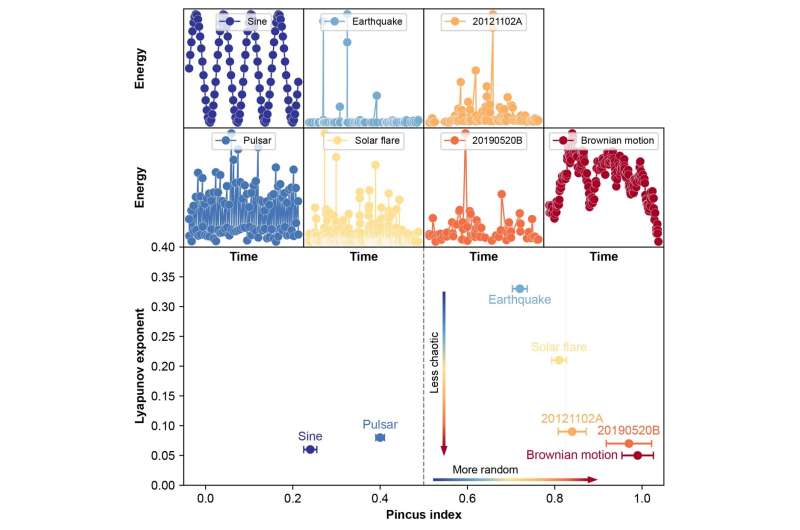
Both randomness and chaos cause unpredictability, but they are distinct. The unpredictability of a random sequence stays constant over time—picture rolling dice, the outcome of each roll bears no link to the previous one. In chaotic systems, unpredictability increases exponentially over time. For example, anyone can predict the weather in the coming seconds by looking up and around, but it is still challenging for mankind to accurately predict weather in the long term.
The team found FRBs to roam around the energy-time phase space, with a lower level of chaos but a higher degree of randomness than those of earthquakes and solar flares. The pronounced randomness of FRB emissions suggests a combination of multiple emission mechanisms or locations. This study establishes a new frame of quantifying FRBs and gets us closer to finally revealing the origin of these violent cosmic explosions.
The research is published in the journal Science Bulletin .
Provided by Science China Press
Explore further
Feedback to editors

Physicists solve puzzle about ancient galaxy found by Webb telescope
22 minutes ago

Researchers study effects of solvation and ion valency on metallopolymers
28 minutes ago

Chemists devise easier new method for making a common type of building block for drugs
30 minutes ago

Research team discovers more than 50 potentially new deep-sea species in one of the most unexplored areas of the planet
17 hours ago

New study details how starving cells hijack protein transport stations

New species of ant found pottering under the Pilbara named after Voldemort
18 hours ago

Searching for new asymmetry between matter and antimatter

Where have all the right whales gone? Researchers map population density to make predictions

Exoplanets true to size: New model calculations shows impact of star's brightness and magnetic activity
19 hours ago

Decoding the language of cells: Profiling the proteins behind cellular organelle communication
Relevant physicsforums posts, will we ever communicate with extraterrestial life in a reasonable time frame.
12 hours ago
Our Beautiful Universe - Photos and Videos
16 hours ago
Speed of the umbra during eclipse vs rate of the Earth's rotation
Apr 12, 2024
Orientation of the Earth, Sun and Solar System in the Milky Way
Apr 11, 2024
What is the actual shape of black holes?
Apr 10, 2024
Increase frequency of solar eclipses
More from Astronomy and Astrophysics
Related Stories

Another clue into the true nature of fast radio bursts
Feb 16, 2024

Fast radio bursts from distant neutron stars resemble earthquakes rather than solar flares
Oct 11, 2023

Astronomers shed new light on formation of mysterious fast radio bursts
Jul 28, 2023

Precise FAST observations reveal circular polarization in active repeating fast radio bursts
Dec 27, 2022

Astronomers find multiple microsecond-length fast radio bursts in data from the Green Bank Telescope
Jul 26, 2023

Astronomers double the number of repeating cosmic probes
Apr 26, 2023
Recommended for you

New tidal stellar stream discovered with Gaia
21 hours ago

Researchers confirm brightest gamma-ray burst of all time came from the collapse of a massive star

Stellar winds of three sun-like stars detected for the first time

Researchers find baby stars discharge plume-like 'sneezes' of magnetic flux during formation

Beautiful nebula, violent history: Clash of stars solves stellar mystery
Let us know if there is a problem with our content.
Use this form if you have come across a typo, inaccuracy or would like to send an edit request for the content on this page. For general inquiries, please use our contact form . For general feedback, use the public comments section below (please adhere to guidelines ).
Please select the most appropriate category to facilitate processing of your request
Thank you for taking time to provide your feedback to the editors.
Your feedback is important to us. However, we do not guarantee individual replies due to the high volume of messages.
E-mail the story
Your email address is used only to let the recipient know who sent the email. Neither your address nor the recipient's address will be used for any other purpose. The information you enter will appear in your e-mail message and is not retained by Phys.org in any form.
Newsletter sign up
Get weekly and/or daily updates delivered to your inbox. You can unsubscribe at any time and we'll never share your details to third parties.
More information Privacy policy
Donate and enjoy an ad-free experience
We keep our content available to everyone. Consider supporting Science X's mission by getting a premium account.
E-mail newsletter
Progress in quantum physics: Researchers tame superconductors
Superconductors are materials that can conduct electricity without electrical resistance -- making them the ideal base material for electronic components in MRI machines, magnetic levitation trains and even particle accelerators. However, conventional superconductors are easily disturbed by magnetism. An international group of researchers has now succeeded in building a hybrid device consisting of a stable proximitized-superconductor enhanced by magnetism and whose function can be specifically controlled.
They combined the superconductor with a special semiconductor material known as a topological insulator. "Topological insulators are materials that conduct electricity on their surface but not inside. This is due to their unique topological structure, i.e. the special arrangement of the electrons," explains Professor Charles Gould, a physicist at the Institute for Topological Insulators at the University of Würzburg (JMU). "The exciting thing is that we can equip topological insulators with magnetic atoms so that they can be controlled by a magnet."
The superconductors and topological insulators were coupled to form a so-called Josephson junction, a connection between two superconductors separated by a thin layer of non-superconducting material. "This allowed us to combine the properties of superconductivity and semiconductors," says Gould. "So we combine the advantages of a superconductor with the controllability of the topological insulator. Using an external magnetic field, we can now precisely control the superconducting properties. This is a true breakthrough in quantum physics!"
Superconductivity Meets Magnetism
The special combination creates an exotic state in which superconductivity and magnetism are combined -- normally these are opposite phenomena that rarely coexist. This is known as the proximity-induced Fulde-Ferrell-Larkin-Ovchinnikov (p-FFLO) state. The new "superconductor with a control function" could be important for practical applications, such as the development of quantum computers. Unlike conventional computers, quantum computers are based not on bits but on quantum bits (qubits), which can assume not just two but several states simultaneously.
"The problem is that quantum bits are currently very unstable because they are extremely sensitive to external influences, such as electric or magnetic fields," says physicist Gould. "Our discovery could help stabilise quantum bits so that they can be used in quantum computers in the future."
- Quantum Physics
- Spintronics
- Quantum Computing
- Spintronics Research
- Quantum Computers
- Computers and Internet
- Quantum computer
- Quantum entanglement
- Absolute zero
- Introduction to quantum mechanics
- John von Neumann
- Albert Einstein
- Bose-Einstein condensate
- Quantum tunnelling
Story Source:
Materials provided by University of Würzburg . Original written by Sebastian Hofmann. Note: Content may be edited for style and length.
Journal Reference :
- Pankaj Mandal, Soumi Mondal, Martin P. Stehno, Stefan Ilić, F. Sebastian Bergeret, Teun M. Klapwijk, Charles Gould, Laurens W. Molenkamp. Magnetically tunable supercurrent in dilute magnetic topological insulator-based Josephson junctions . Nature Physics , 2024; DOI: 10.1038/s41567-024-02477-1
Cite This Page :
Explore More
- Genes for Strong Muscles: Healthy Long Life
- Brightest Gamma-Ray Burst
- Stellar Winds of Three Sun-Like Stars Detected
- Fences Causing Genetic Problems for Mammals
- Ozone Removes Mating Barriers Between Fly ...
- Parkinson's: New Theory On Origins and Spread
- Clash of Stars Solves Stellar Mystery
- Secure Quantum Computing at Home
- Ocean Currents: Collapse of Antarctic Ice ...
- Pacific Cities Much Older Than Previously ...
Trending Topics
Strange & offbeat.
Thank you for visiting nature.com. You are using a browser version with limited support for CSS. To obtain the best experience, we recommend you use a more up to date browser (or turn off compatibility mode in Internet Explorer). In the meantime, to ensure continued support, we are displaying the site without styles and JavaScript.
- View all journals
Particle physics articles from across Nature Portfolio
Particle physics is the study of the elementary building blocks of matter and radiation and their interaction. The fundamental particles are summarised by the standard model. This includes leptons (such as the electron), the quarks that make up protons and neutrons, and gauge bosons, which mediate forces between the other particles.
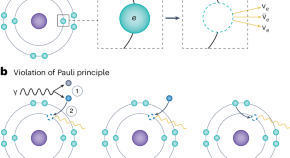
Search for rule-breaking electrons
Questioning the validity of axioms can teach us about physics beyond the standard model. A recent search for the violation of charge conservation and the Pauli exclusion principle yields limits on these scenarios.
- Alessio Porcelli
Related Subjects
- Experimental particle physics
- Particle astrophysics
- Phenomenology
- Theoretical particle physics
Latest Research and Reviews
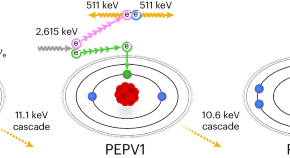
Search for charge non-conservation and Pauli exclusion principle violation with the M ajorana D emonstrator
The M ajorana D emonstrator experiment reports searches for the violation of the Pauli exclusion principle and of charge conservation. In the absence of a signal, exclusion limits for these processes are reported.
- I. J. Arnquist
- F. T. Avignone III
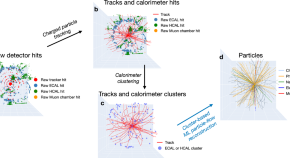
Improved particle-flow event reconstruction with scalable neural networks for current and future particle detectors
The next generation of high energy particle colliders will have features that allows for highly granular detectors and current methods for particle collision reconstruction are limited. The authors explore machine learning algorithms for reconstructing events in electron-positron collisions for such future colliders obtaining a best-performing graph neural network that enhances the jet transverse momentum resolution by up to 50%, outperforming traditional methods and promising significant advancements in future collider measurements.
- Joosep Pata
- Javier Duarte
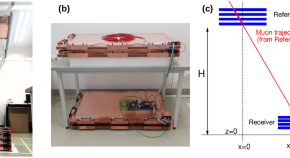
Developments of a centimeter-level precise muometric wireless navigation system (MuWNS-V) and its first demonstration using directional information from tracking detectors
- Dezso Varga
- Hiroyuki K. M. Tanaka
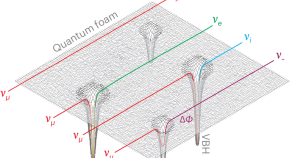
Search for decoherence from quantum gravity with atmospheric neutrinos
Interactions of atmospheric neutrinos with quantum-gravity-induced fluctuations of the metric of spacetime would lead to decoherence. The IceCube Collaboration constrains such interactions with atmospheric neutrinos.
- M. Ackermann
- M. Zimmerman
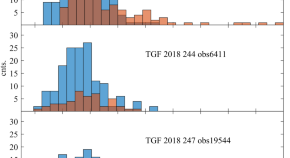
Imaging of 3 bright terrestrial gamma-ray flashes by the atmosphere-space interactions monitor and their parent thunderstorms
- Oscar A. van der Velde
- Javier Navarro-González
- Nikolai Østgaard
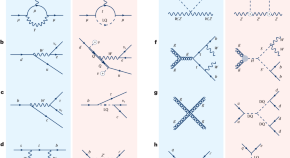
Anomalies in particle physics and their implications for physics beyond the standard model
The standard model of particle physics describes the fundamental constituents of matter and their interactions. We review the status of experimental hints for new physics, which, if confirmed, would require the extension of the standard model with new particles and new interactions.
- Andreas Crivellin
- Bruce Mellado
News and Comment

Peter Higgs obituary: physicist who predicted boson that explains why particles have mass
Theoretical physicist saw his eponymous particle discovered after 48 years.
- Christine Sutton
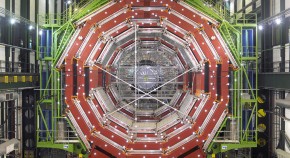
A supercollider glimpses a gathering of three particles never seen together before
Data from billions of proton collisions reveal that subatomic particles called W + and W − bosons keep company with a photon.

China’s giant underground neutrino lab prepares to probe cosmic mysteries
Due to come online this year, the JUNO facility will help to determine which type of neutrino has the highest mass — one of the biggest mysteries in physics.
- Gemma Conroy
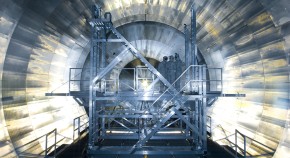
How heavy is a neutrino? Race to weigh mysterious particle heats up
Physicists discuss experiments that could improve laboratory measurements of the super-light particle’s mass.
- Davide Castelvecchi

CERN’s supercollider plan: $17-billion ‘Higgs factory’ would dwarf LHC
A feasibility study on the Future Circular Collider identifies where and how the machine could be built — but its construction is far from a done deal.
- Elizabeth Gibney
Quick links
- Explore articles by subject
- Guide to authors
- Editorial policies
- Follow us on Facebook
- Follow us on Twitter
- Follow us on LinkedIn
- Watch us on Youtube
- Latest Explore all the latest news and information on Physics World
- Research updates Keep track of the most exciting research breakthroughs and technology innovations
- News Stay informed about the latest developments that affect scientists in all parts of the world
- Features Take a deeper look at the emerging trends and key issues within the global scientific community
- Opinion and reviews Find out whether you agree with our expert commentators
- Interviews Discover the views of leading figures in the scientific community
- Analysis Discover the stories behind the headlines
- Blog Enjoy a more personal take on the key events in and around science
- Physics World Live
- Impact Explore the value of scientific research for industry, the economy and society
- Events Plan the meetings and conferences you want to attend with our comprehensive events calendar
- Innovation showcases A round-up of the latest innovation from our corporate partners
- Collections Explore special collections that bring together our best content on trending topics
- Artificial intelligence Explore the ways in which today’s world relies on AI, and ponder how this technology might shape the world of tomorrow
- #BlackInPhysics Celebrating Black physicists and revealing a more complete picture of what a physicist looks like
- Nanotechnology in action The challenges and opportunities of turning advances in nanotechnology into commercial products
- The Nobel Prize for Physics Explore the work of recent Nobel laureates, find out what happens behind the scenes, and discover some who were overlooked for the prize
- Revolutions in computing Find out how scientists are exploiting digital technologies to understand online behaviour and drive research progress
- The science and business of space Explore the latest trends and opportunities associated with designing, building, launching and exploiting space-based technologies
- Supercool physics Experiments that probe the exotic behaviour of matter at ultralow temperatures depend on the latest cryogenics technology
- Women in physics Celebrating women in physics and their contributions to the field
- Audio and video Explore the sights and sounds of the scientific world
- Podcasts Our regular conversations with inspiring figures from the scientific community
- Video Watch our specially filmed videos to get a different slant on the latest science
- Webinars Tune into online presentations that allow expert speakers to explain novel tools and applications
- IOP Publishing
- Enter e-mail address
- Show Enter password
- Remember me Forgot your password?
- Access more than 20 years of online content
- Manage which e-mail newsletters you want to receive
- Read about the big breakthroughs and innovations across 13 scientific topics
- Explore the key issues and trends within the global scientific community
- Choose which e-mail newsletters you want to receive
Reset your password
Please enter the e-mail address you used to register to reset your password
Registration complete
Thank you for registering with Physics World If you'd like to change your details at any time, please visit My account
- Dark matter and energy
- Research update
Baryon acoustic oscillations hint that dark energy may have changed over time
Preliminary observations made by the Dark Energy Spectroscopic Instrument (DESI) hint that the acceleration of the expansion of the universe has not been constant – in other words, dark energy has changed over the history of the universe.
At the turn of the millennium, astronomers discovered that the universe has been expanding at an ever increasing rate. This came as a shock to most cosmologists who had assumed that the pull of gravity was slowing the expansion of the universe after the Big Bang.
In 1998 and 1999, two independent teams discovered the acceleration by measuring the distances to supernovae and the speeds that they are receding from Earth. Dark energy – a term that was coined in 1998 – was invoked to provide the vast amount of energy required for this constant acceleration. Three leaders of those teams shared the 2011 Nobel Prize for Physics for the discovery, and in the past quarter century a variety of observations have backed the inclusion of dark energy in the Standard Model of cosmology.
Now, another shock could be coming thanks to DESI, which was designed to study the expansion of the universe.
Robot-controlled optical fibres
DESI is located on the Nicholas U Mayall Telescope at the Kitt Peak National Observatory in Arizona. In comprises thousands of robot-controlled optical fibres that send light to an array of spectrographs. This allowed DESI to make an extensive map of galaxies and quasars in the universe. The spectroscopic data provide a measure of how fast a galaxy is moving away from us, which is determined by a galaxy’s redshift.
Key to DESI’s dark-energy study is that galaxies are not uniformly distributed throughout the universe, but rather are concentrated in bubble-like regions that are surrounded by emptier space. This is a result of how the early universe expanded and cooled. The process started with a hot plasma through which sound waves propagated, creating areas of high and low density called baryon acoustic oscillations (BAO).
Eventually this plasma “froze” to create the gas that would go on to form the earliest stars and galaxies. Bubbles of galaxies tended to form in the dense regions created by BAO, and these expanded along with the universe. Therefore, the size of a galaxy bubble tells astronomers how old it was when it sent us its light. The team also used the light from ancient quasars to illuminate the BAO, allowing them to probe further back in time than was possible with the galaxy measurements.
Tantalizing hints
Putting the spectroscopic and BAO information together, DESI team could determine the expansion rate of the universe at seven different points in time over the past 11 billion years. While their observations are broadly in line with a constant value of dark energy, DESI scientists have reported tantalizing hints of some deviation.
“So far, we’re seeing basic agreement with our best model of the universe, but we’re also seeing some potentially interesting differences that could indicate that dark energy is evolving with time,” explains DESI’s director Michael Levi , who is based at the Lawrence Berkeley National Laboratory in the US. “Those may or may not go away with more data, so we’re excited to start analysing our three-year dataset soon.”

New theory links supermassive black holes and dark energy
While the team found that its observations are consistent with dark energy varying with time, the statistical significance of the deviation is only about 3σ. This means that there is about a 0.2% chance that the observation is a statistical fluke. In cosmology and some other fields of physics, a significance of 5σ is required for a discovery.
These observations were made in the first year of operation of DESI, which is expected to survey the universe for at least five years.
“It’s astonishing that with only our first year of data, we can already measure the expansion history of our universe at seven different slices of cosmic time, each with a precision of 1 to 3%,” says Berkeley’s Nathalie Palanque-Delabrouille . “The team put in a tremendous amount of work to account for instrumental and theoretical modelling intricacies, which gives us confidence in the robustness of our first results.”
As well as shedding new light on the expansion of the universe, DESI has also provided new information about the mass of the neutrino.
The BAO observations are described in a preprint on arXiv . Related publications can be found here .
Want to read more?
- E-mail Address

Astronomy and astrophysics subject collection
Further your research with the astronomy and astrophysics collection from IOP Publishing
- Fabrication and process
Roll-to-roll-fabricated hybrid perovskite solar cells reach record efficiencies
- Particles and interactions
Heat capacity measurements reveal Majorana fermions
Discover more from physics world.

Cosmic combat: delving into the battle between dark matter and modified gravity

- Astronomy and space
Milky Way’s supermassive black hole has a surprising magnetic personality
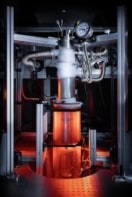
- Quantum mechanics
Giant quantum tornado behaves like a black hole in miniature
Related jobs, cosmic-ray instrument scientist at goddard space flight center, science program officer, heising-simons foundation, computer system administrator (csa), related events.
- Astronomy and space | Conference SPIE Astronomical Telescopes + Instrumentation 2024 16—21 June 2024 | Yokohama, Japan
- Particle and nuclear | Symposium Fifth International Symposium on the Casimir Effect 15—21 September 2024 | Piran, Slovenia
- Astronomy and space | Conference Seventh International Conference on the Nature and Ontology of Spacetime 16—19 September 2024 | Albena, Bulgaria
Featured Topics
Featured series.
A series of random questions answered by Harvard experts.
Explore the Gazette
Read the latest.

Faculty working groups formed on institutional voice, fostering open inquiry

For the young at heart, and fleet of foot

Harvard announces return to required testing
From scissors, pfas everywhere to effects of standardized tests, incarcerated moms.

Harvard Horizon Scholars Claire Lamman (from left), Jiemin Tina Wei, Mauro Lazarovich, Bethany Kotlar, Noah Toyonaga, Juhee Kang, Heidi Pickard, and Dylan Renaud.
Photos by Niles Singer/Harvard Staff Photographer
Samantha Laine Perfas
Harvard Staff Writer
Harvard Horizons Symposium highlights stunning, impactful research of grad students
The audience at Sanders Theatre whooped and cheered last Tuesday night. “Let the Harvard Horizons 2024 Symposium begin!” boomed Emma Dench, dean of the Harvard Kenneth C. Griffin Graduate School of Arts and Sciences. Each year, a GSAS committee picks eight Ph.D. students to participate in Harvard Horizons , an initiative to recognize and celebrate the work of promising scholars. The selected grad students get the opportunity to present their work at the symposium and prepare through personalized coaching sessions with faculty mentors and the Derek Bok Center for Teaching and Learning.
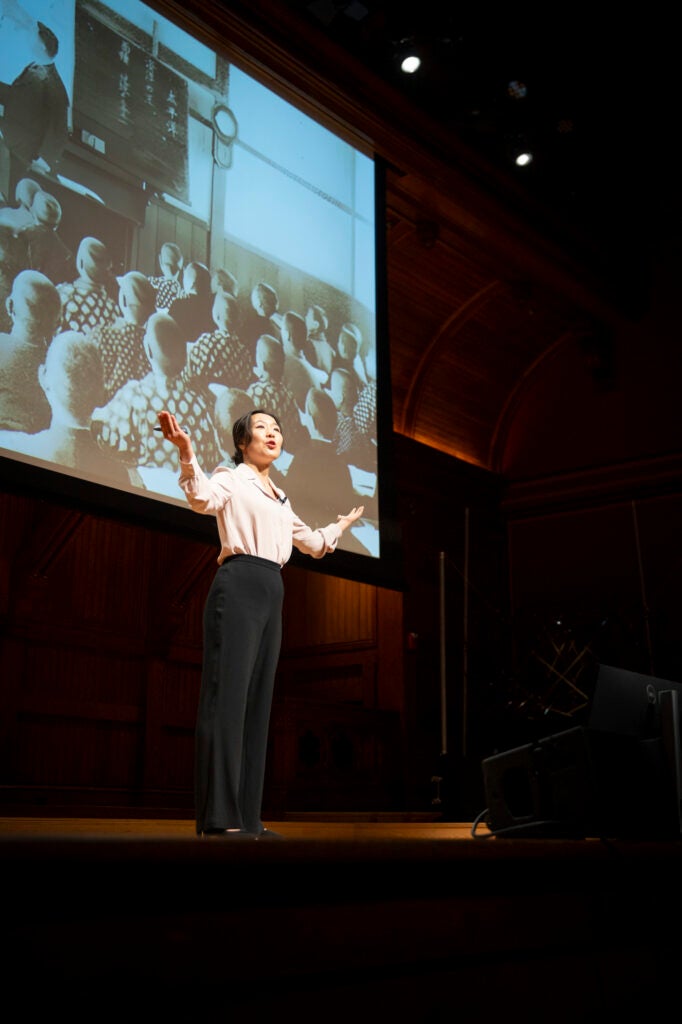
History and East Asian Languages and Civilizations
As Japan was modernizing its education system in the early 20th century, the nation faced a problem: how to distribute resources in a fair and efficient way? The Ministry of Education turned to standardized testing. In her talk, Kang traced the evolution of the practice, showing how officials attempted to measure and categorize intellect and personality traits. While some of these methods delivered chuckles from the audience, Kang emphasized that studying these early tests is helpful in tracing the evolution of the measurement of human intelligence. “All tests are experiments, and even when experiments fail, we learn something for the better,” she said.

Bethany Kotlar
Population health sciences.
Kotlar has already changed the lives of hundreds of incarcerated women and their children through her nonprofit Motherhood Beyond Bars, which provides education and support for that community. Her work began in one of Georgia’s largest prisons, as she sat and listened to women who were imprisoned while pregnant. “Their stories changed my career,” she told the audience. In the U.S., prison is the only institutional structure in which women and their newborns are routinely separated, mere hours after birth. The effects of this and of the incarceration of expectant mothers on in utero development have only just begun to be studied. Her work is uncovering the serious consequences incarceration has on this critical time in early childhood development. “It’s time to stop punishing these babies in utero. These children deserve better,” she said.

Claire Lamman
“In dark skies, you can see an uncountable number of stars. But deep in the darkness behind them lie an even greater number of galaxies,” Lamman began her talk. She is participating in a global project to create a map of galaxies. The way the celestial systems interact with each other in space is like a tangled, complex web. She acknowledges that their work is big, at “scales well beyond our daily experience.” And yet it’s important work that addresses fundamental human questions: What does the universe look like? How does it change? And why?

Mauro Lazarovich
Romance languages & literatures.
Lazarovich began his talk by reciting “La Huella,” a poem by the Chilean poet Gabriela Mistral written in 1939. He used this poem to talk about how poetry and art have been used for decades to address human refugee crises throughout time. Mistral, the pen name of diplomat and educator Lucila Godoy Alcayaga, became the first Latin American author to receive the Nobel Prize in literature. She witnessed the plight of these stateless people in her role as a consul. And while she couldn’t question diplomatic policy in that role, she could do so as a poet, Lazarovich said. He cited her work as an example of how writers and artists grapple with the challenge of using their voices to advocate for the rights of others. “Their works confront us readers with these realities, compelling us to articulate our own ethical responsibilities,” Lazarovich said.

Heidi Pickard
Engineering sciences.
Pickard joked that she is what one might call a “chemical detective,” investigating the presence of PFAS, also known as forever chemicals, in the water we drink and food we consume. PFAS, which have been linked to certain cancers and endocrine problems, are used in a shockingly wide array of consumer products and packaging. Tens of thousands of PFAS now exist, leading to global contamination in our environment — and our bodies. “PFAS is in the blood of every single one of us in this room,” she told the audience. Despite the danger, there is little oversight or regulation. What’s more, only a few well-known PFAS can be detected and measured. She’s trying to close that gap and raise awareness of why this issue is critical. In closing, she said, “Together, we can combat this invisible threat and reduce our exposure to these harmful chemicals.”

Dylan Renaud
Applied physics.
“Data is all around us, and we just can’t seem to get enough of it,” Renaud said. But handling and storing the massive amounts of data produced today requires enormous amounts of energy. And it isn’t slowing down: Up to 24 percent of global energy consumption could be dedicated to storing data by 2030. Renaud has identified one area that could increase efficiency — updating conventional modulators. In his research, he created a technology called thin-film lithium niobate modulators. These devices — which contain features as much as 100 times smaller than the thickness of human hair — resulted in a 20 percent reduction in energy. With further research and development, they could go even further. “While [there are] big challenges, I think these tiny devices are up for the task,” he said.

Noah Toyonaga
“Geometry for me is a way of seeing, is a way of appreciating, understanding, and playing,” Toyonaga said. And in the last few years, he’s been playing around with the geometry of scissors. This shape — created by two straight pieces with a pivot between them — appears in biology, textiles, and architecture. Through a method he calls amigami, he created a lattice of scissors that could be used to solve a host of design problems. Showing the audience the shape, which he referred to as the “big donut,” he explained that it’s just one example of how playing with geometry could result in new discoveries. “There’s nothing magical about scissors,” he said. “[Many shapes] could be similarly unpacked to reveal a host of beautiful, unexpected phenomena.”
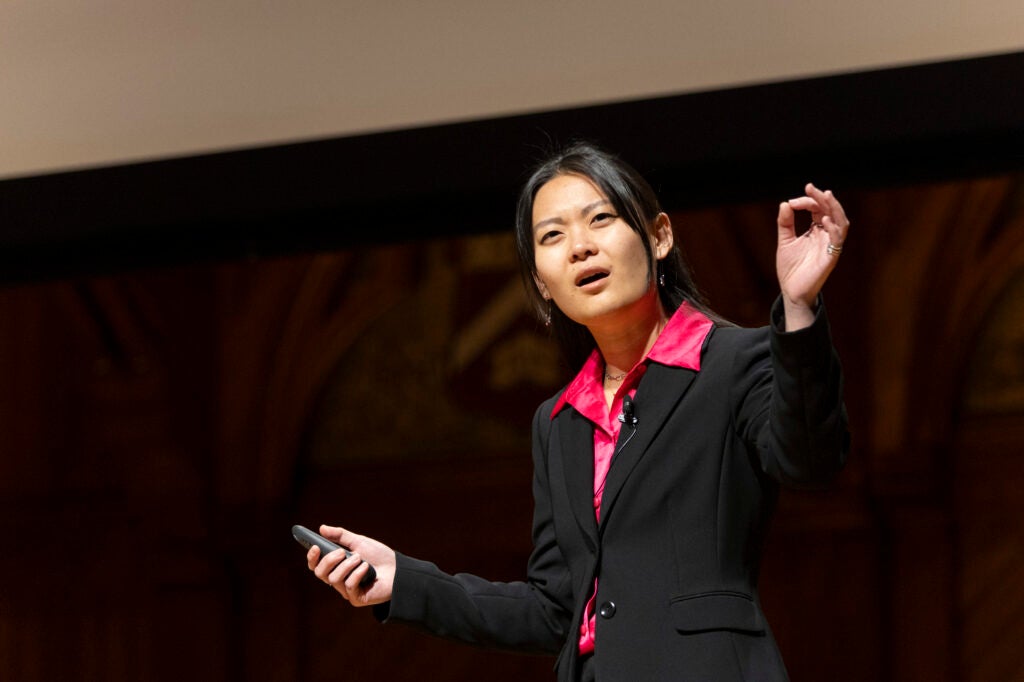
Jiemin Tina Wei
History of science.
“To the average American office worker, modern wellness can feel exhausting,” Wei said, showing a variety of recently published self-help and wellness books on screen. Her work focuses on learning how we became a society fixated on addressing work fatigue and burnout. Experts began wrestling with labor shortages during the rapid industrialization of the early 1900s. Researchers pitched solutions ranging from ways to address physical fatigue to improved ergonomics to suggesting the problem was all in the mind. Some of this research has led to what we see in high-stress, 24/7 work environments like those in Silicon Valley, with the blurring of work-life boundaries and the creation of a culture in which workers simply work harder and longer. She said that in some ways, companies learned that if you can harness the minds of workers, you can “make labor work for you.”
Share this article
You might like.
Garber, Manning announce Noah Feldman, Alison Simmons, Tomiko Brown-Nagin, and Eric Beerbohm as chairs

Harvard runners take on the Boston Marathon

Leading researchers cite strong evidence that testing expands opportunity
Yes, it’s exciting. Just don’t look at the sun.
Lab, telescope specialist details Harvard eclipse-viewing party, offers safety tips
For all the other Willie Jacks
‘Reservation Dogs’ star Paulina Alexis offers behind-the-scenes glimpse of hit show, details value of Native representation

IMAGES
VIDEO
COMMENTS
Physics Research Topics for Grade 9. Investigating the properties of waves: amplitude, frequency, wavelength, and speed. The effect of temperature on the expansion and contraction of materials. The relationship between mass, velocity, and momentum. The behavior of light in different mediums and the concept of refraction.
Physics articles from across Nature Portfolio. Physics is the search for and application of rules that can help us understand and predict the world around us. Central to physics are ideas such as ...
Research Areas. The MIT Department of Physics is recognized as a worldwide leader in physics research, providing students with opportunities across a wide range of fields. We strive to be at the forefront of many areas where new physics can be found. While we often study the simplest things, such as individual atoms, we study the most ...
Frontiers in Multi-Source Positioning, Navigation and Timing (PNT) Zukun Lu. Zhu Xiao. David Plets. 432 views. One of the most viewed journals in its field, which addresses the biggest questions in physics, from macro to micro, and from theoretical to experimental and applied physics.
Read interesting physics news and the latest physics research discoveries on SciTechDaily. Your premier source for the latest revelations, innovations, and research in the captivating world of physics includes recent breakthroughs from sources like Harvard, MIT, Los Alamos, Rice University, Princeton, and Lawrence Berkeley.. We bring you up-to-the-minute information on a wide array of topics ...
Top 100 in Physics. This collection highlights our most downloaded* physics papers published in 2021. Featuring authors from around the world, these papers showcase valuable research from an ...
Quantum Information Science. QIS research studies the application of quantum physics to information science and technology. AEP has research groups spanning quantum sensing, communications, simulation, and computing, with experimental approaches including superconducting circuits, trapped ions, photonics, and semiconductor devices.
Physics Top 100 of 2023. This collection highlights the most downloaded* physics research papers published by Scientific Reports in 2023. Featuring authors from around the world, these papers ...
Physical Review Research welcomes papers from the full spectrum of research topics of interest to the physics community. Research coverage in the journal comprises: fundamental and applied; theoretical and experimental, including technical and methodological advances; and interdisciplinary and newly emerging areas. See the full scope
See all (781) Learn more about Research Topics. One of the most viewed journals in its field, which addresses the biggest questions in physics, from macro to micro, and from theoretical to experimental and applied physics.
One of the most viewed journals in its field, which addresses the biggest questions in physics, from macro to micro, and from theoretical to experimental and applied physics. ... Part of a research topic; Not part of a research topic; Clear all Filters Articles. Original Research. Published on 09 Apr 2024 Vaccination strategies in the disease ...
Research. The Harvard Department of Physics and its collaborators are leaders in a broad spectrum of physics research, utilizing facilities and technologies that are continually being modified and improved with changing research interests and techniques. This provides students, postdoctoral fellows, and other research sholars with opportunities ...
Physics Research Paper Topics for University. Metamaterials: Creating the Impossible in Optics and Acoustics. Fluid Dynamics in Astrophysics: Stars, Galaxies, and Beyond. Tackling Turbulence: The Last Great Problem in Classical Physics. The Casimir Effect: Unearthing Quantum Force in the Vacuum.
Physical Review Research is a fully open access, peer-reviewed, international, multidisciplinary journal covering all research topics of interest to the physics community. The open access publishing model supports the aim of the journal—to broadly disseminate high-quality research from all of physics, the physical sciences, and ...
Over the years, countless ground-breaking discoveries have been made, from the theory of relativity to the discovery of the Higgs boson. In this article, iLovePhD will present you with the top 50 emerging research topics in physics, highlighting the frontiers of knowledge and the exciting possibilities they hold.
Research Topics. Scientists and engineers at the Center for Astrophysics | Harvard & Smithsonian collaborate across a broad variety of scientific disciplines, from astronomy and astrophysics to related areas of physics and geophysics, in advancing humanity's understanding of the universe. Learn more about the full spectrum of research covered ...
100 Interesting Physics Topics For Research Paper In 2023. Searching for a topic in physics can be one of the more difficult challenges for students at any level. Teachers and professors want their students to research and write something original. They also want students to challenge themselves by pushing the envelope and studying new areas in ...
Definition of Classical Physics and Research Topics for it; Classical physics is the physics in which, from the physical ideas the newer ideas are predated. It basically encompasses all the theories that are drawn before the 20th century. Energy and the theory of matter are regarded as independent concepts throughout classical physics. Top 10 ...
Theoretical physics articles from across Nature Portfolio. Theoretical physics is the development of mathematical formalisms and computational protocols for describing all aspects of objects found ...
Research Topics description from ~2008: The broad focus of Prof. Baranger's group is the interplay of electron-electron interactions and quantum interference at the nanoscale. Fundamental interest in nanophysics - the physics of small, nanometer scale, bits of solid - stems from the ability to control and probe systems on length scales larger ...
Physics thesis topics should be wide enough to provide you with a wealth of information to address all key issues. But it should also be constrained by the requirements of your assignment. We can assist you in providing simple physics research topics. Check out our list of physics research topics for undergraduates, which includes subjects from ...
Create music by rubbing your finger against the rim of a glass. Experiment with several glasses filled with different amounts of water. Compare the free-fall speed of a Lego figure using various parachutes. Experiment with BEC to understand quantum mechanics. Make a windmill and describe how it works.
STM image of a chiral interface state wavefunction (bright stripe) in a QAH insulator made from twisted monolayer-bilayer graphene in a 2D device.Credit: Canxun Zhang/Berkeley Lab An international research team led by Lawrence Berkeley National Laboratory (Berkeley Lab) has taken the first atomic-resolution images and demonstrated electrical control of a chiral interface state
The research is published in the journal Science Bulletin. More information: Yong-Kun Zhang et al, The arrival time and energy of FRBs traverse the time-energy bivariate space like a Brownian ...
Progress in quantum physics: Researchers tame superconductors. ScienceDaily . Retrieved April 9, 2024 from www.sciencedaily.com / releases / 2024 / 04 / 240404113523.htm
Particle physics is the study of the elementary building blocks of matter and radiation and their interaction. The fundamental particles are summarised by the standard model. This includes leptons ...
Magazine; Latest. Latest Explore all the latest news and information on Physics World; Research updates Keep track of the most exciting research breakthroughs and technology innovations; News Stay informed about the latest developments that affect scientists in all parts of the world; Features Take a deeper look at the emerging trends and key issues within the global scientific community
the URECA researcher of the month for April — is an Honors College junior double majoring in physics and applied mathematics. Since January 2023, he has been working under the mentorship of Assistant Professor Jesús Pérez-Ríos on using machine learning for atomic and molecular physics, and was listed as a co-first author for his contributions to a Journal of Molecular Spectroscopy article ...
Featured Topics. Cost of war; ... In his research, he created a technology called thin-film lithium niobate modulators. These devices — which contain features as much as 100 times smaller than the thickness of human hair — resulted in a 20 percent reduction in energy. ... Physics "Geometry for me is a way of seeing, is a way of ...